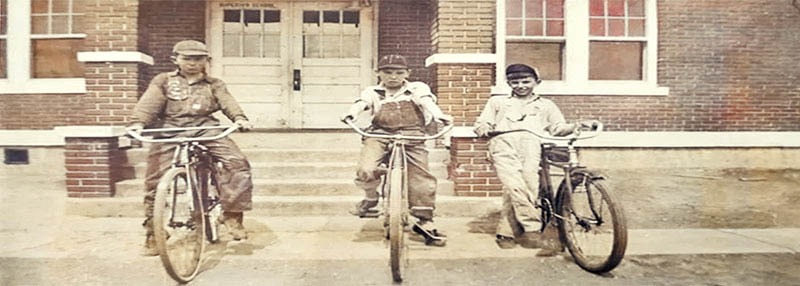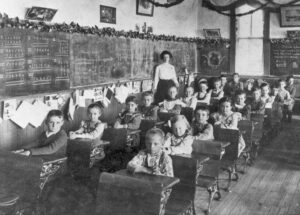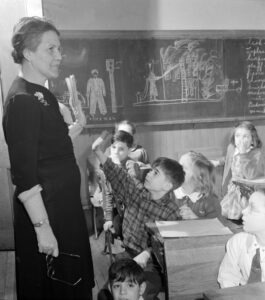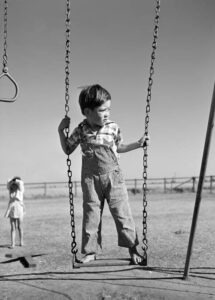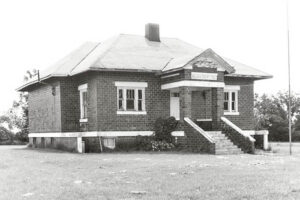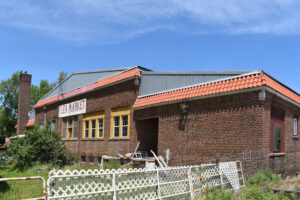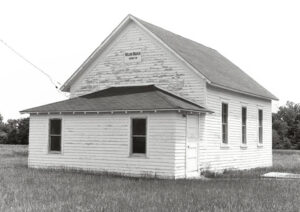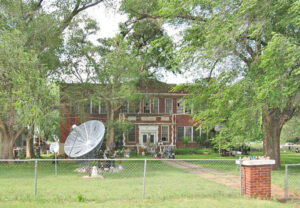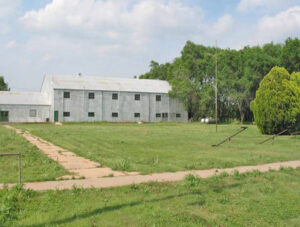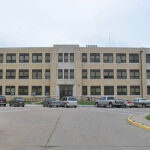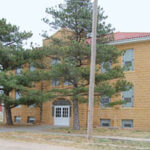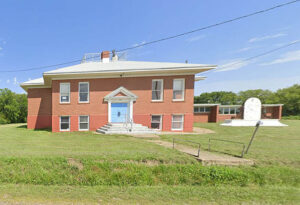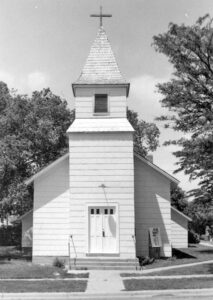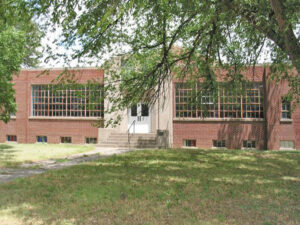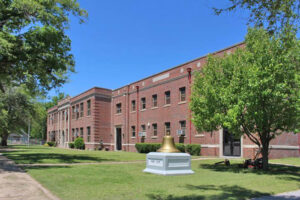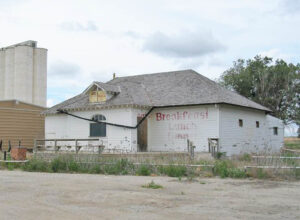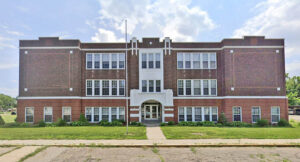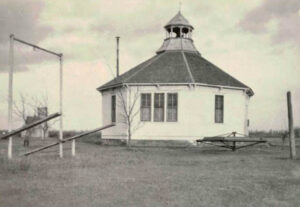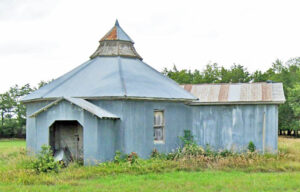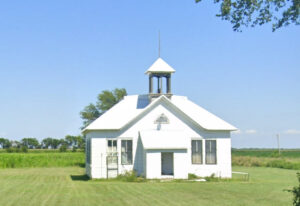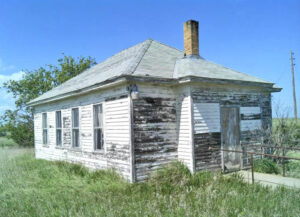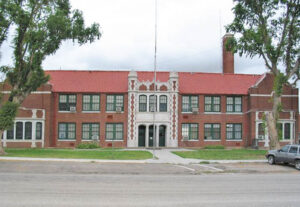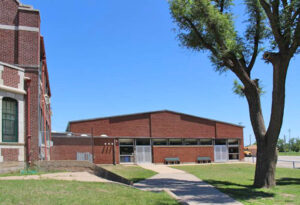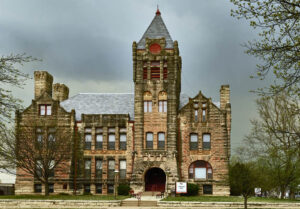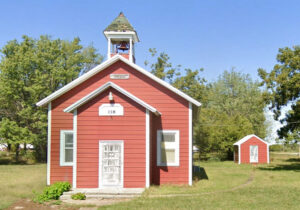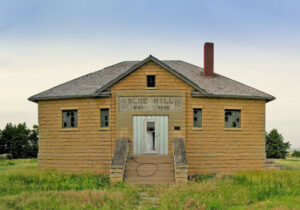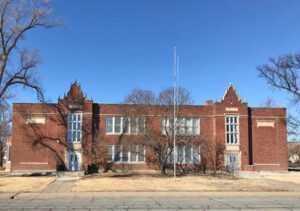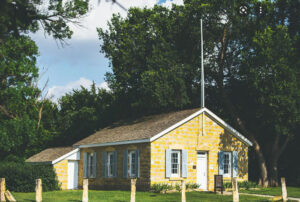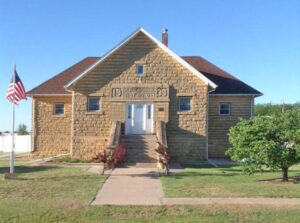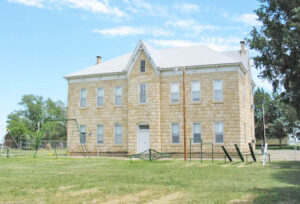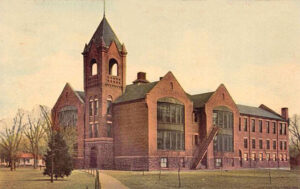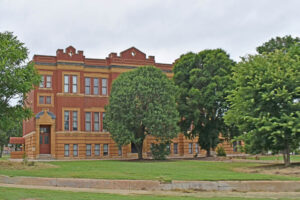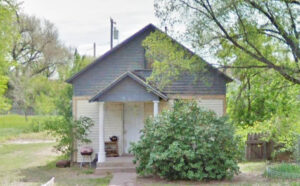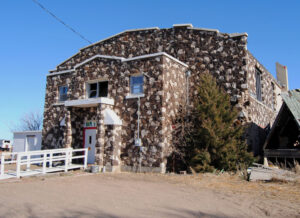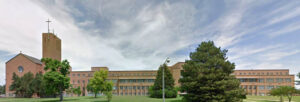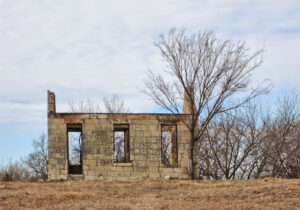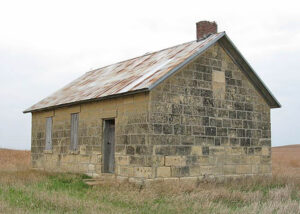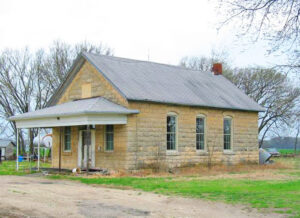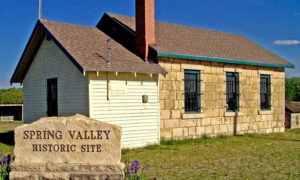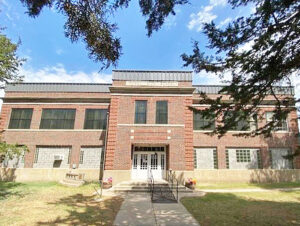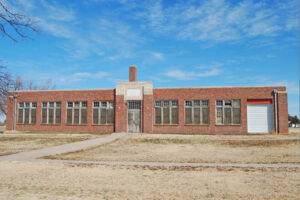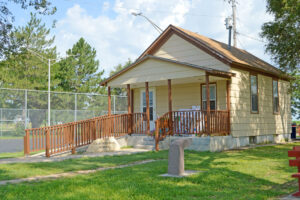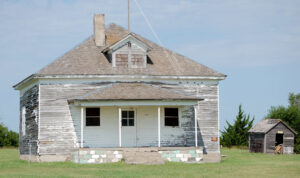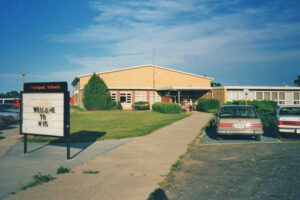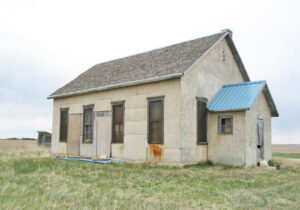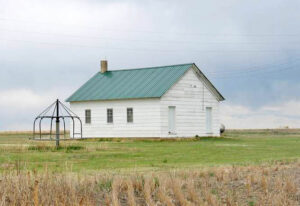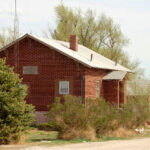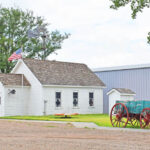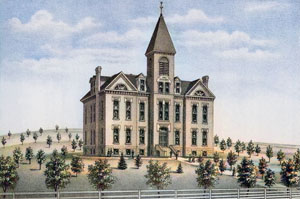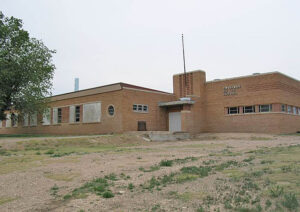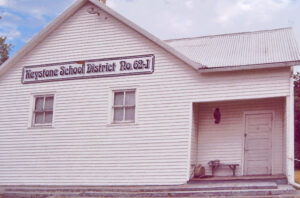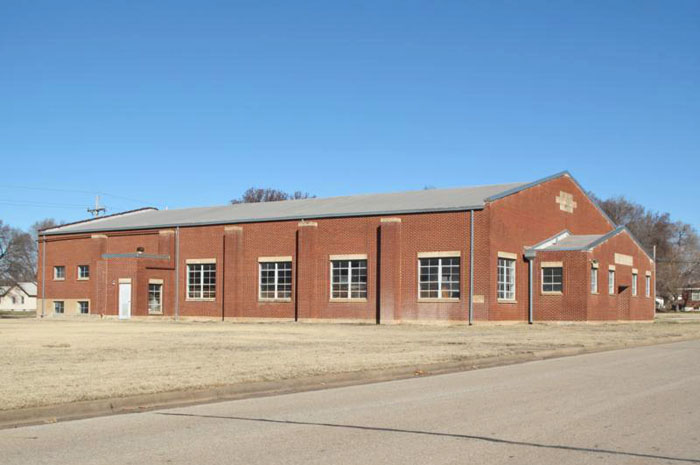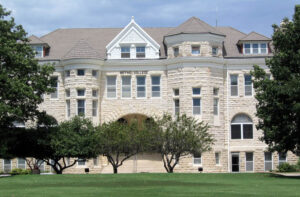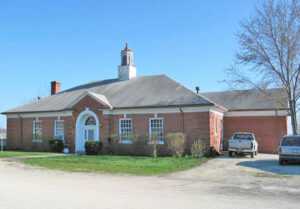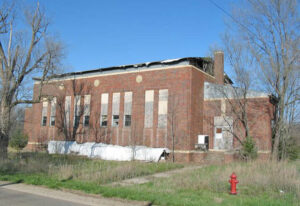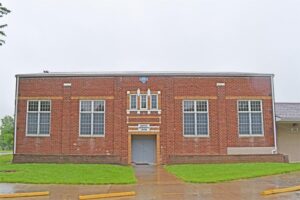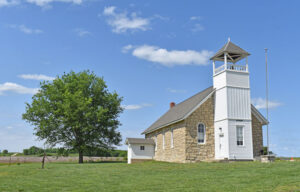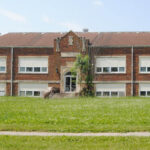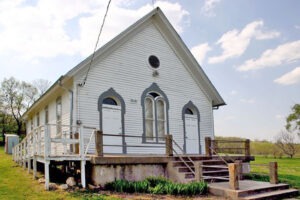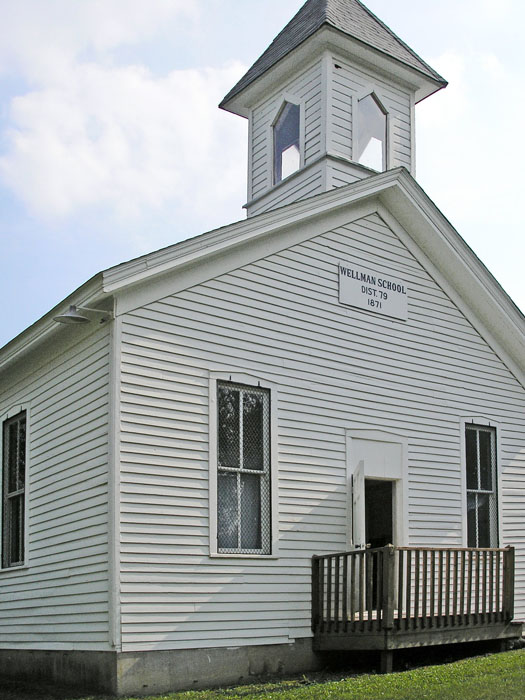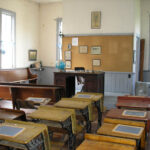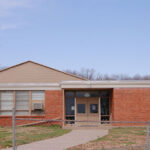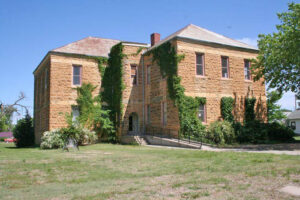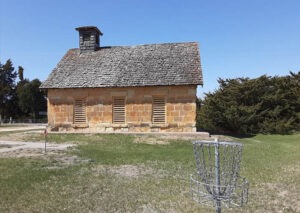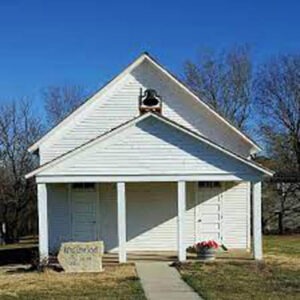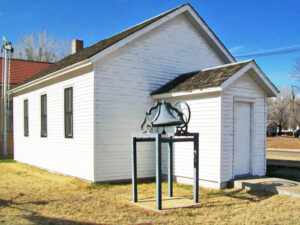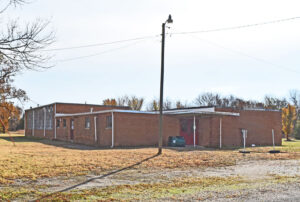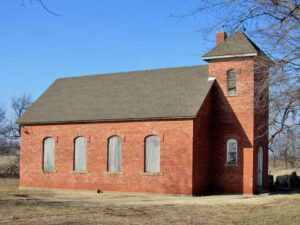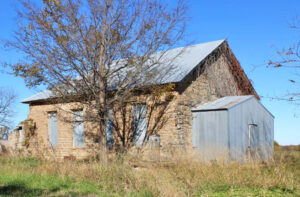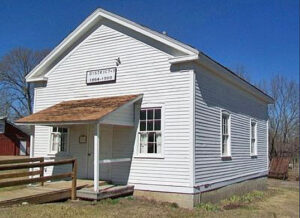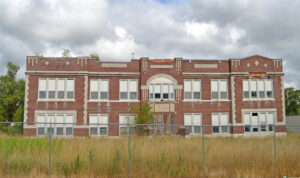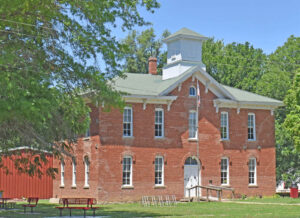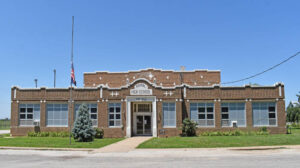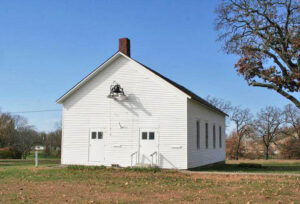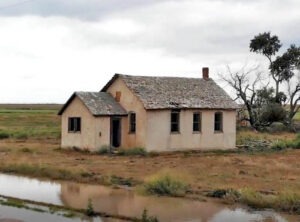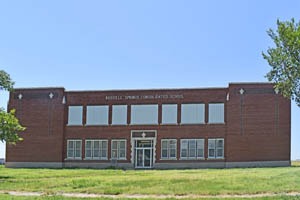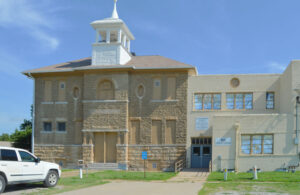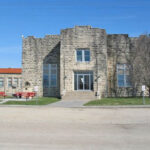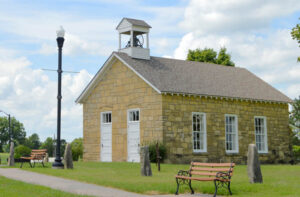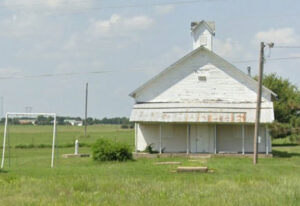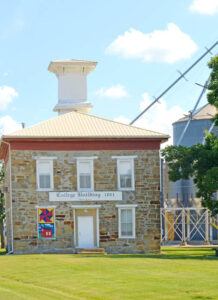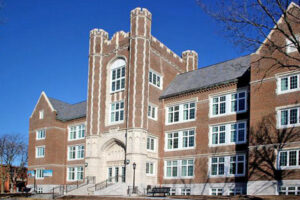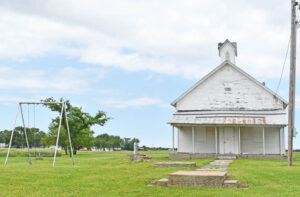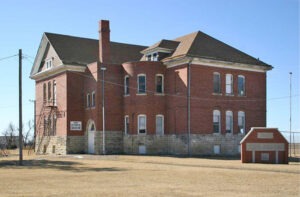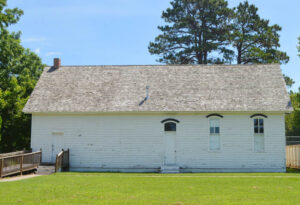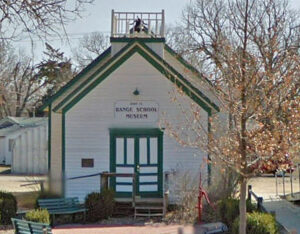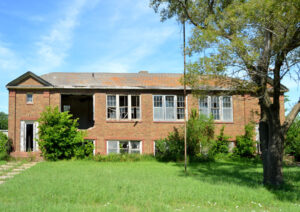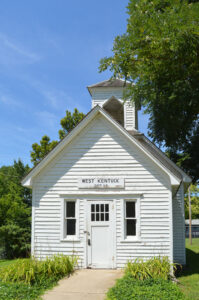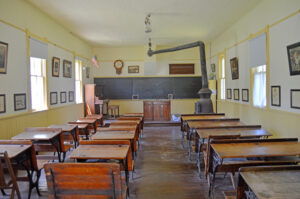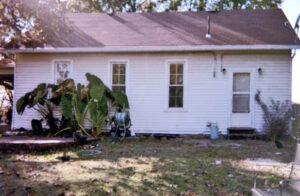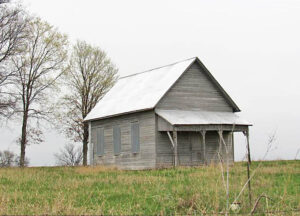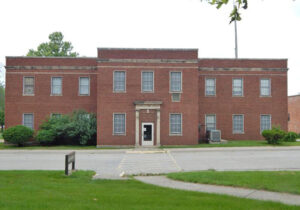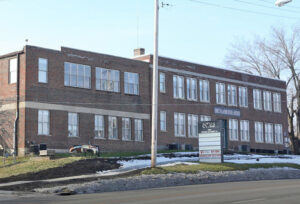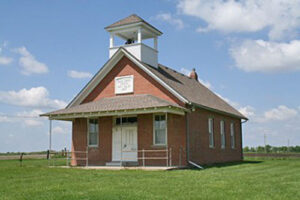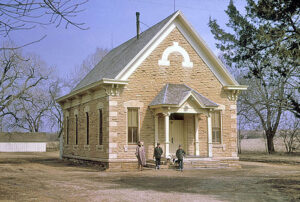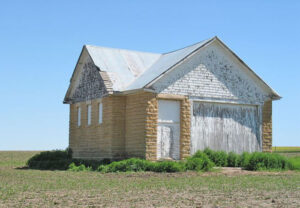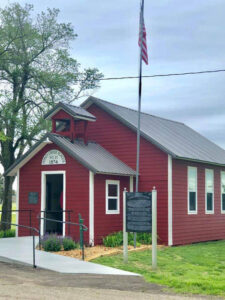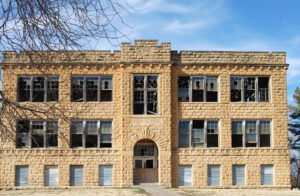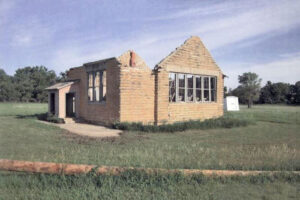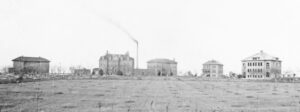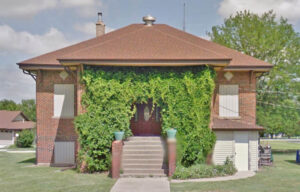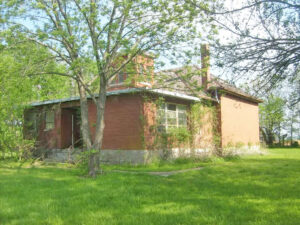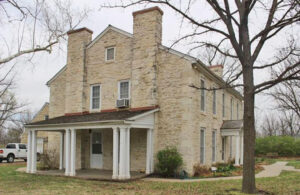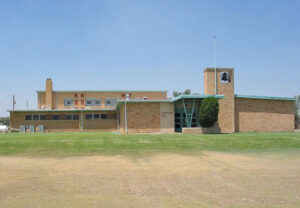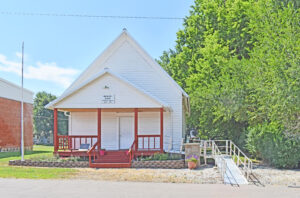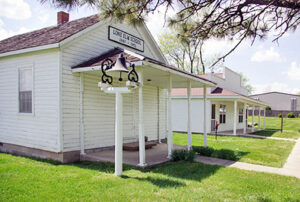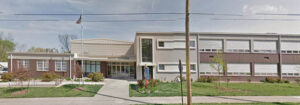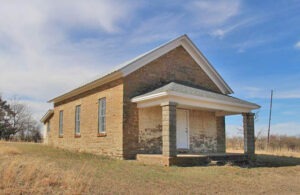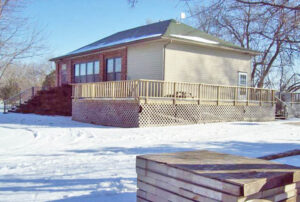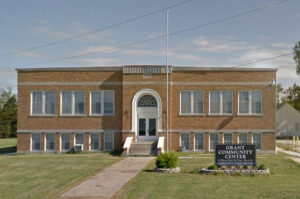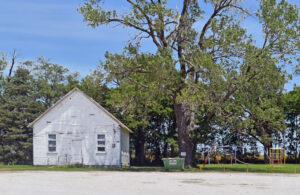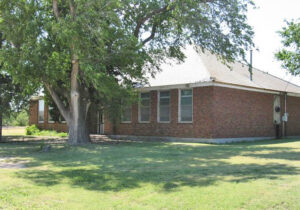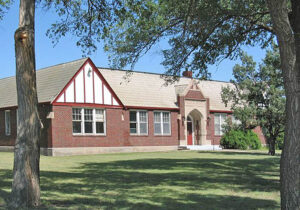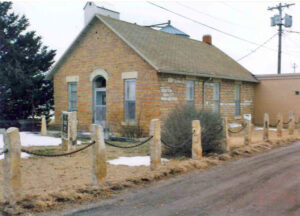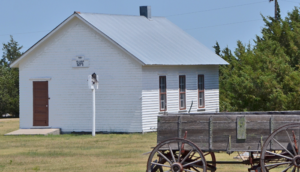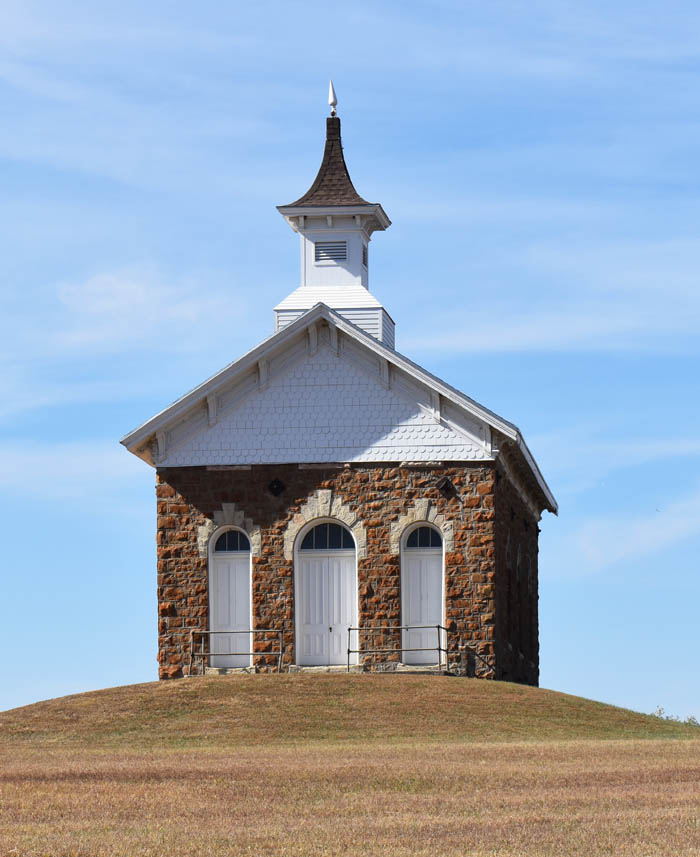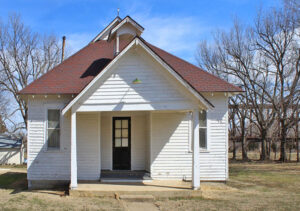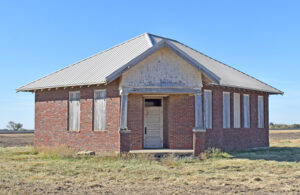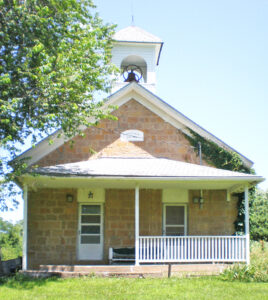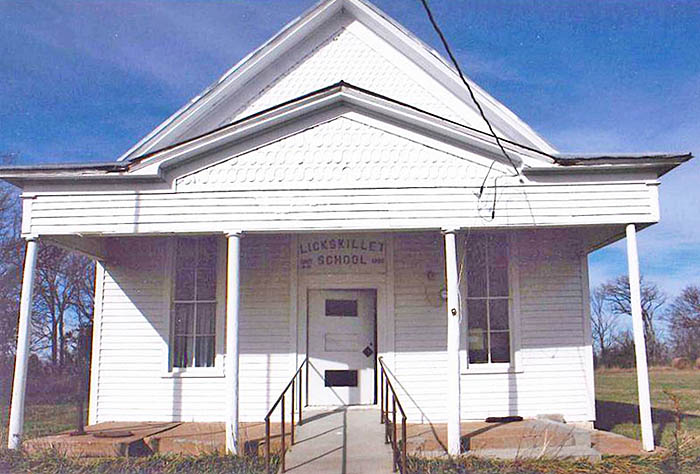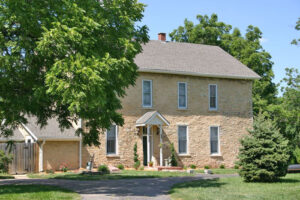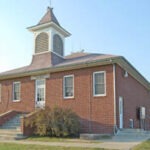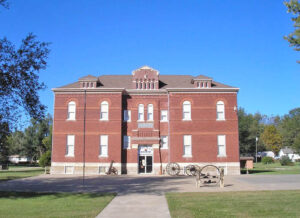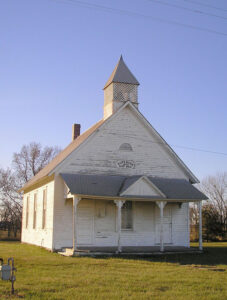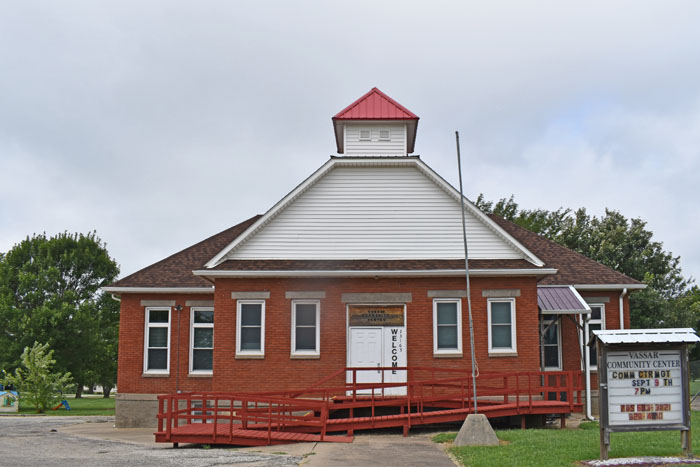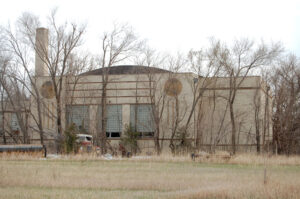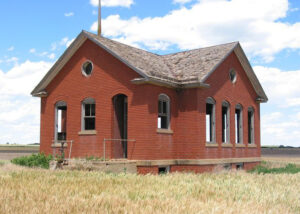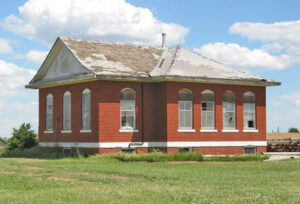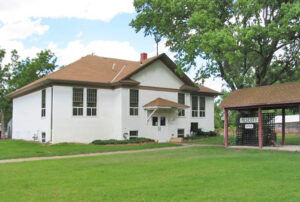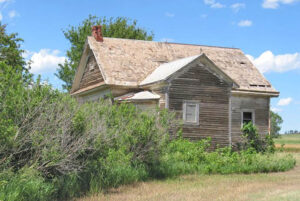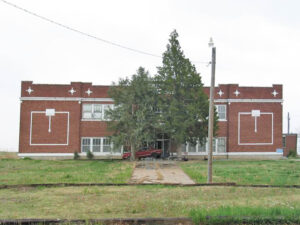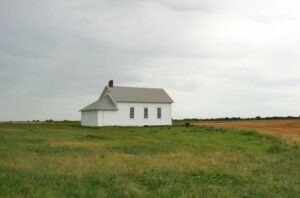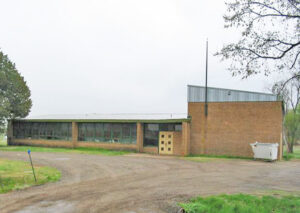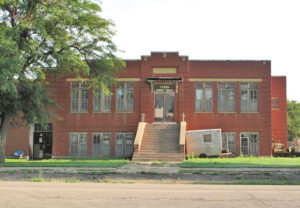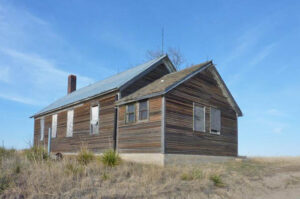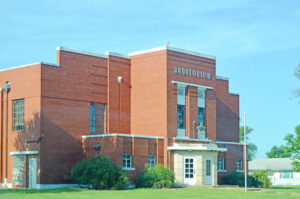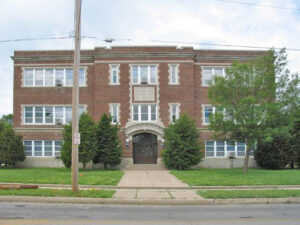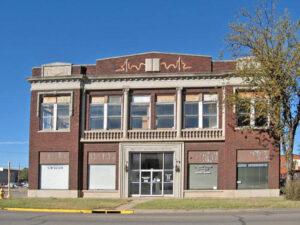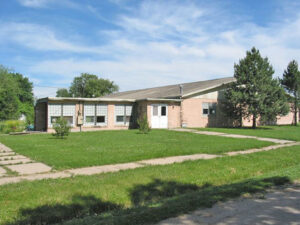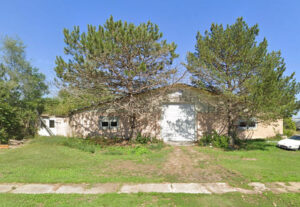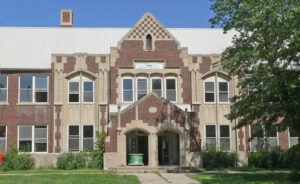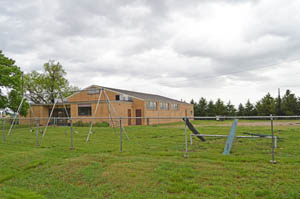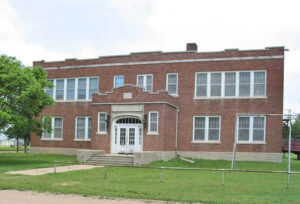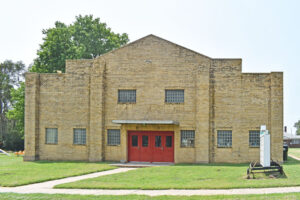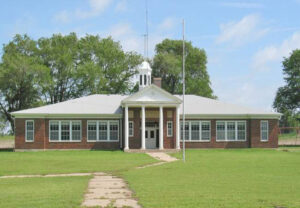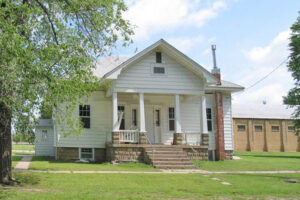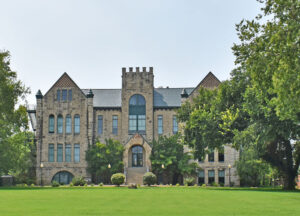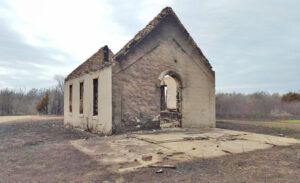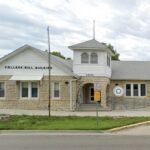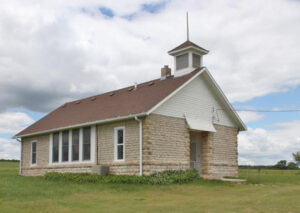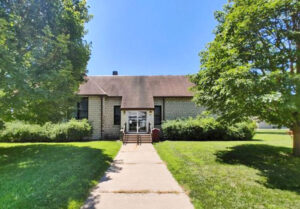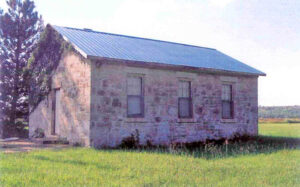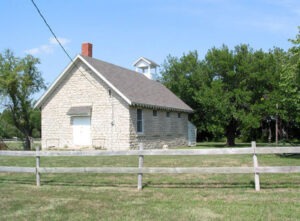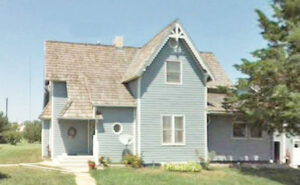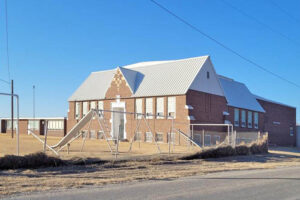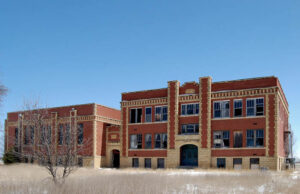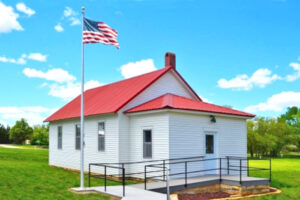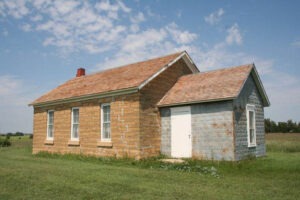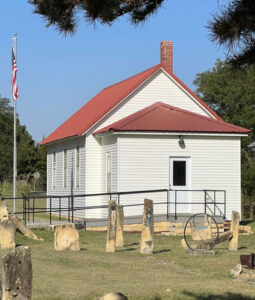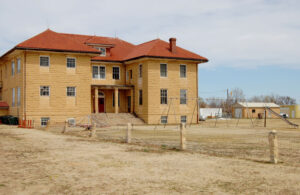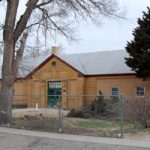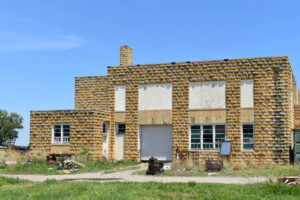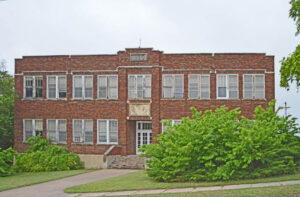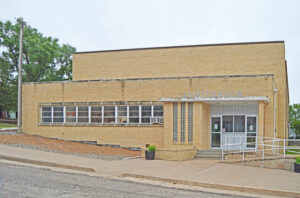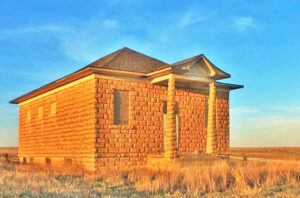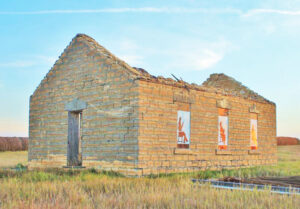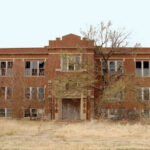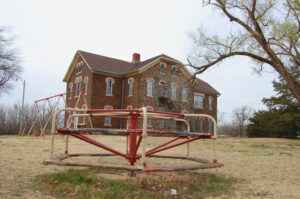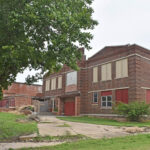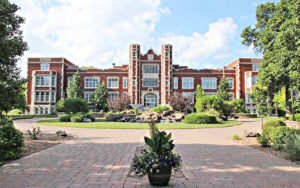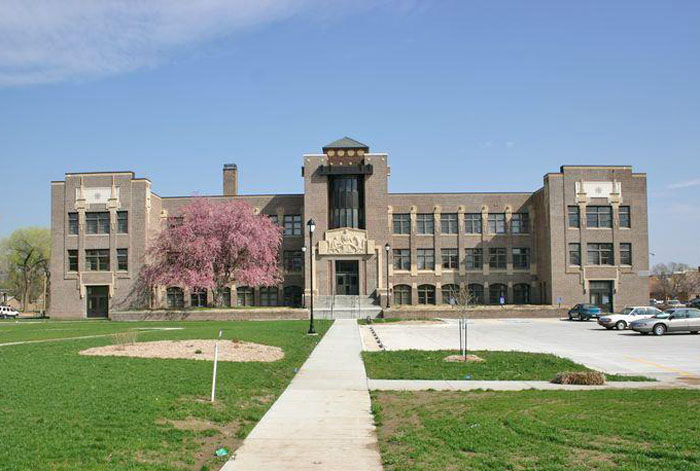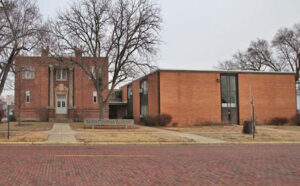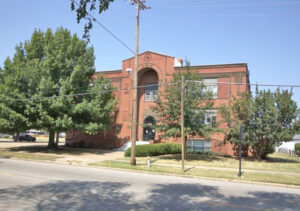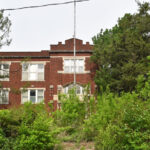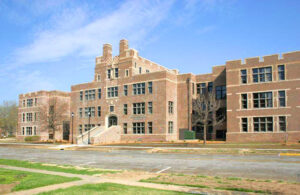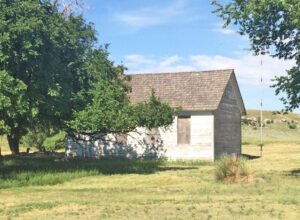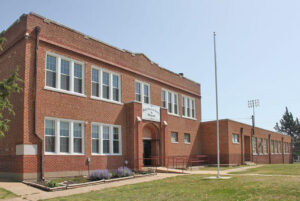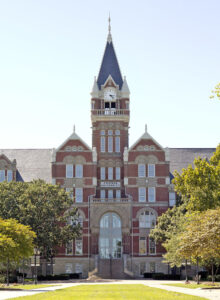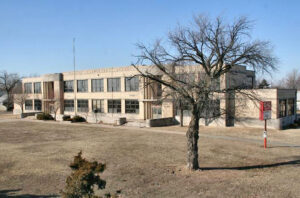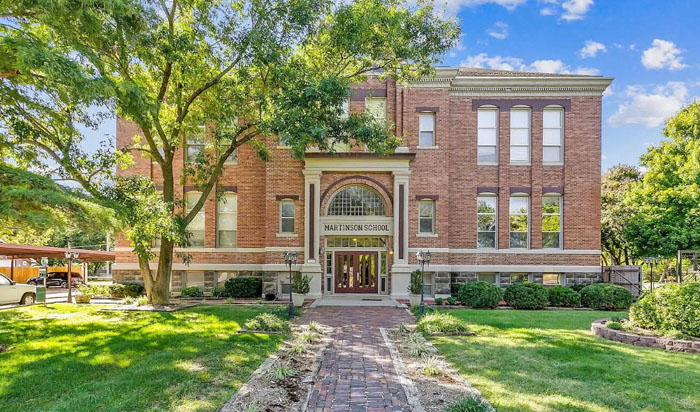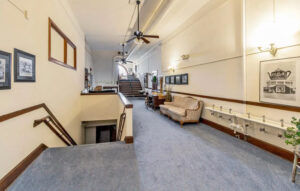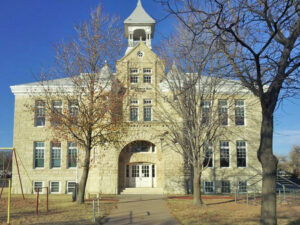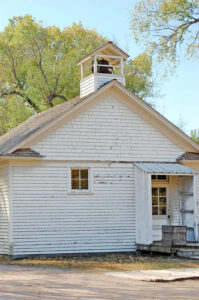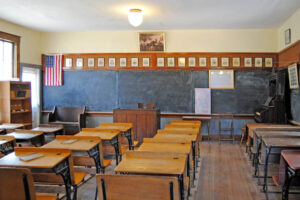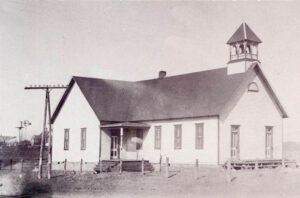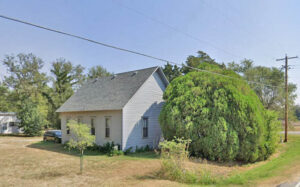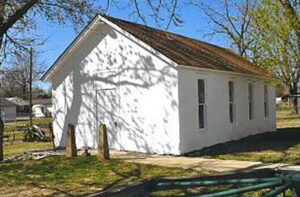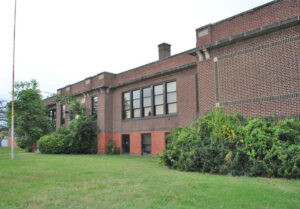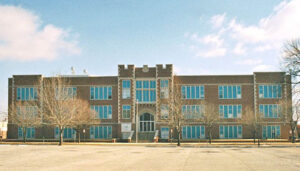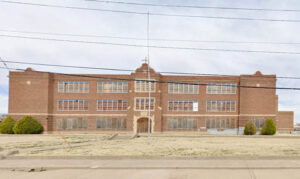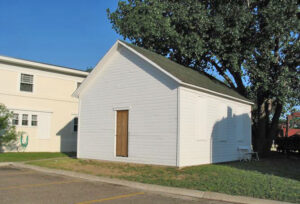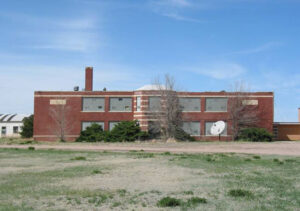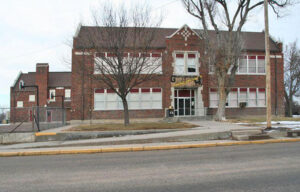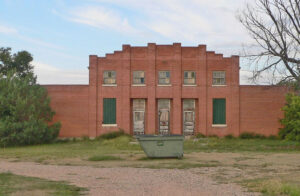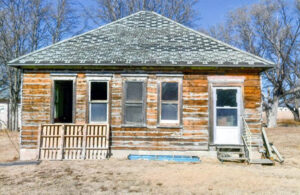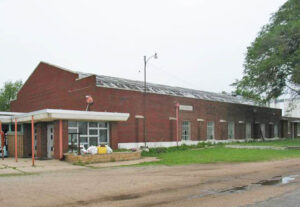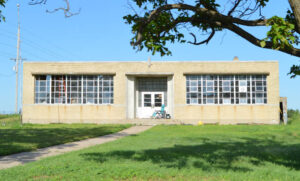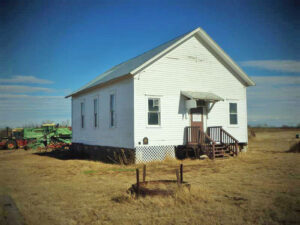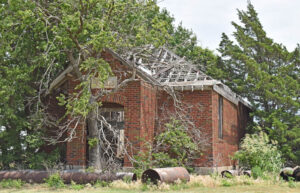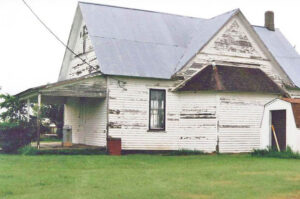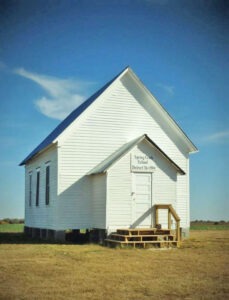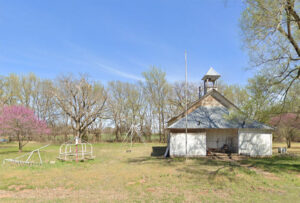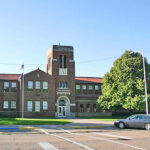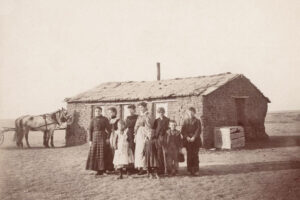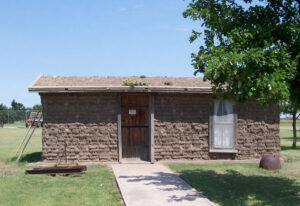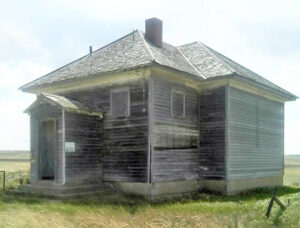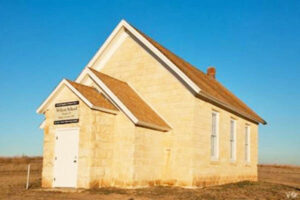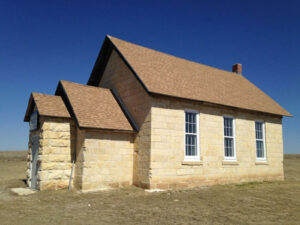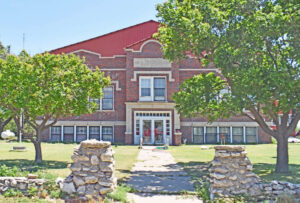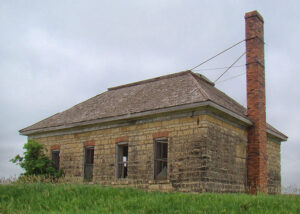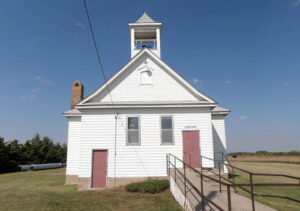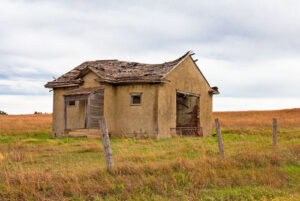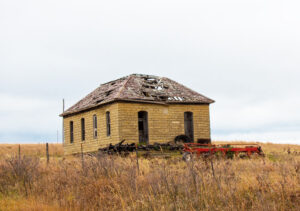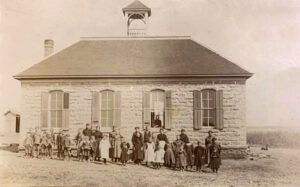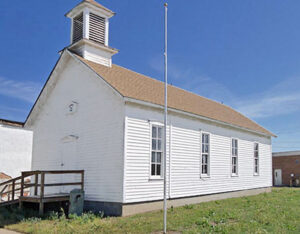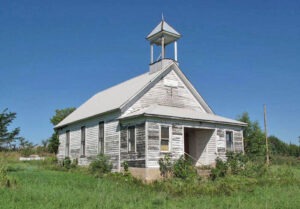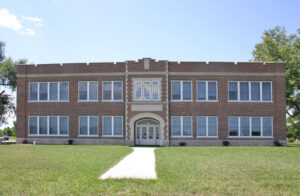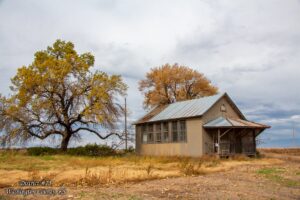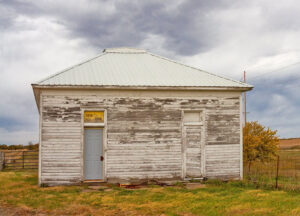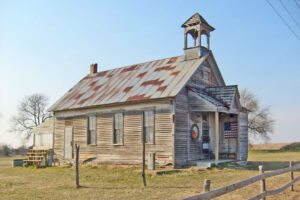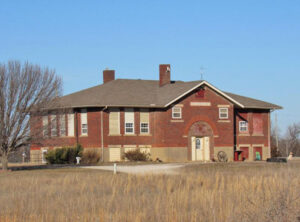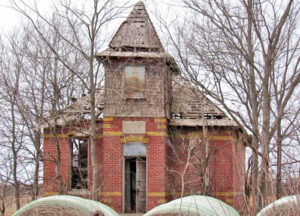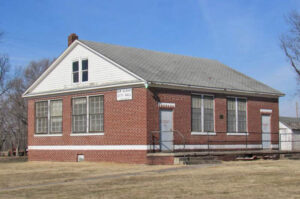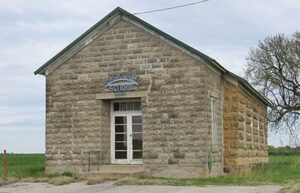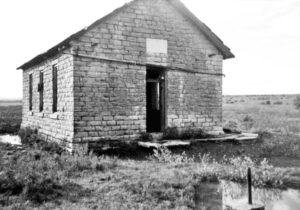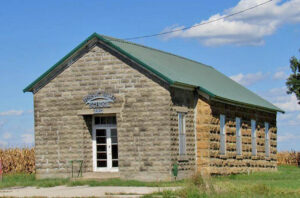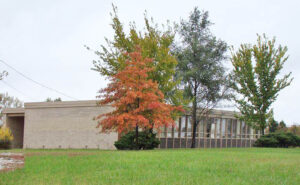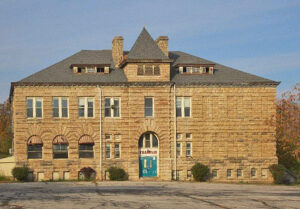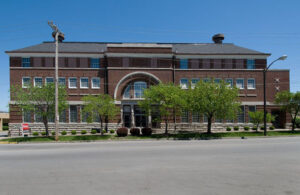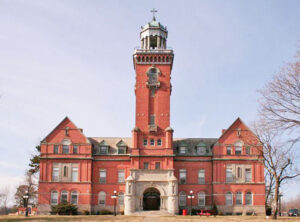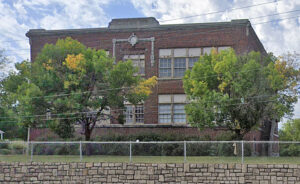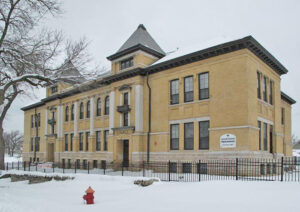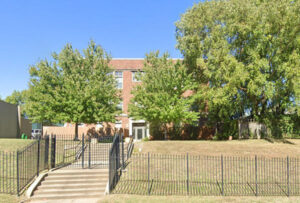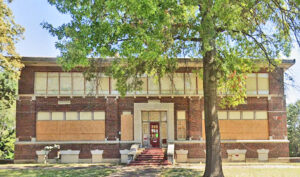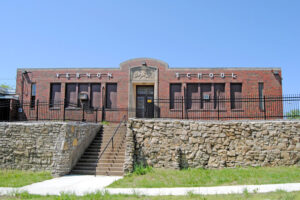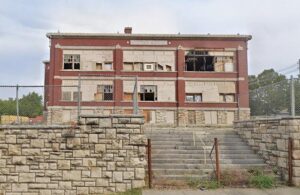We cross the prairies, as of old
The Fathers crossed the sea,
To make the West, as they the East,
The homestead of the free.
“We come to plant the common schools
On distant prairie swells,
And give the Sabbaths of the Wild
The music of their bells.
— John Whittier
The first schools in Kansas were mission schools for Native Americans. When Kansas was organized as a Territory, and white settlers began to make their homes there, their children’s education became one of their first concerns. In the summer of 1855, the first Territorial Legislature passed a law establishing common schools, laying the foundation for our public school system.
In January 1855, when Lawrence, Kansas, was only six months old, a school was opened in the back of Dr. Charles Robinson’s office in the town. In the early years, due to the violence of Bleeding Kansas, most schools were subscription schools, not publicly funded, with tuition paid by each pupil who attended.
By 1859, when Territorial conditions had become more settled, the Legislature passed a set of school laws that served as the basis of education in Kansas. Afterward, a few school districts were established, and schoolhouses were built, with a minimum school term of three months.
Over the next century, white-frame or native-stone one-room schoolhouses dotted the Kansas landscape.
They were named Prairie Flower, Bazaar, Rocky Glen, and Good Intent. The children who attended ranged in age from five to 21 and endured the difficulties of frontier Kansas, including prairie fires, cattle drives, and dust storms, to get an eighth-grade education. They traveled to school on foot, on horseback, or in a wagon. Many students were foreign nationals who quickly learned to speak, read, spell, and write English.
Although the minimum term was three months, it was usually extended slightly for the benefit of the younger children. Generally, older boys and girls attended school only during the winter, when they could be spared from farm work. Students worked as far as possible each year, continuing where they left off in the following school session. Many continued until they were 18 to 21 years old or even older. At that time, no students graduated from country schools — students attended until they were ready to leave.
The school teacher, sometimes not much older than her students, also served as a nurse, janitor, musician, sports instructor, and more for less than $50 a month. Equipped with little more than a blackboard and a few textbooks, teachers imparted to their students knowledge of the “three Rs”—reading, writing, and arithmetic —and cultural values.
These were often called “home schoolhouses,” meaning that the school was in the school district where they resided. It was not uncommon for the family who sold the land for the school to often live adjacent to the property and provide room and board for the teacher. Because the schoolhouse was usually located on one of the better roads, someone would often try to set up a country store near the school.
The nearby store was a dynamic addition to the activities centered around the school. Area residents would trade butter, cream, eggs, bacon, fresh-killed game, hides, and furs to the local store for credit. The store owner often ran a freight business, bringing mail-order goods from larger towns. He also brought back the area’s mail, newspapers, magazines, and gossip. These country stores often became the center of the local economy, attracting other retail operations and services.
The schoolhouse was often the social and political center of the school district. The playground often had a baseball diamond where the locals played, and the school building served as a meeting center for various causes and events. These included a polling center, club meetings, and recreational events and celebrations such as harvest festivals, holiday celebrations, amateur theatricals, and musical recitals. Some schools also served church congregations.
By the turn of the century, the population shifted to the cities, and country schools began to lose students and tax support. By then, one-room schools could no longer compete with larger, better-equipped schools in the cities. Additionally, these rural schools had difficulty retaining teachers year to year due to low pay and declining enrollment. With improved roads and automobiles, school consolidation led to the first wave of the elimination of one-room schools, often after bitter debates that pitted farmers against town residents.
One-room schools struggled through the Great Depression. After World War II, many were eliminated as mobility became more common and mechanization increased farm size. This reduced the number of farms, prompting people to migrate to cities. Half of Kansas‘ one-room schools were closed between 1945 and 1950.
In subsequent years, school districts consolidated, pooling their resources to provide more teachers, broader curricula, and greater opportunities for extracurricular activities. With the unification of school districts, one-room schools were abandoned.
In some cases, the schools were auctioned off and converted into homes. If the building were on farmland, farmers would often burn the structure to reclaim the land for farms or pastures. Other schoolhouses, however, deteriorated over time and with exposure to the elements.
By 1966, the one-room country school had become a relic.
However, various projects have been undertaken to preserve the memory of these one-room schools, many of which have been preserved by local landowners, community groups, and museums.
The first white school taught in Morris County, Kansas, was at Council Grove in 1857, with Miss Sarah Stevenson as the teacher. Mr. T.S. Huffaker, however, had been employed as early as 1850 to teach the Kanza Indians in the Mission building, and while thus employed, several white children attended his school.
| Name | District | County | Years of Operation | Location & Information |
| Selma | ?? | Anderson | 1921-1964 |
This one-story T-shaped building was built in the Craftsman/Bungalow style with brown tile, brick, and stone. It has a deck-on-hip roof with watercourse sills and lintels, and a west façade portico entrance with a gable overhang. The school was closed and consolidated with the elementary school in Kincaid in 1964. Vacant today, it is located on Wabaunsee Road in the extinct town of Selma, Kansas. |
| Welda | ?? | Anderson | 1926-1873 |
This one-story, rectangular red brick building was designed in the commercial style, with a red-tile gable roof. After it closed in 1873, it was utilized as a flea market. Located at SW 1000 Road in Welda, Kansas, it appears to be abandoned today. |
| Willow Branch | ?? | Anderson | 1900 |
This one-story, rectangular wood-frame school was designed in the vernacular style, featuring four-inch clapboards, a gable roof, and a hip entrance extension on the West façade. Southeast of the school, an old outhouse is located on Vermont Road in Bush City, Kansas. |
| Atchison County Schools | Various | Atchison | 1871-Present | The graded course of study pursued in public schools is in accord with the most advanced methods adopted in the East. A specific program of work is to be completed annually, and teachers across the grades strictly follow it. In addition to the Superintendent of City Schools and the High School Principal, 29 regular and two substitute teachers are employed to maintain public education in Atchison. The average daily attendance in May 1882 was 1,886, representing 82% of the total enrollment of 2,310. |
| Lake City Rural High School | ?? | Barber | 1920-?? |
This two-story, rectangular red-brick building, built in a commercial style with Colonial Gothic influences, was built in a commercial style with Colonial Gothic influences. This vacant, deteriorating building is missing most of its glass, the roof is gone, and the structure is open to the elements. It is located at 14122 River Road in Lake City, Kansas. |
| Sun City Gymnasium | ?? | Barber | 1951-?? |
This large, rectangular building, designed in a commercial style with a corrugated-metal gable roof, is currently used as a community center and sports facility. The gymnasium has tongue-and-groove yellow pine walls, a full-size court with seating for 800, built-in team benches, and a scorer’s table. The original school building was demolished, and only the flagpole and playground equipment, excluding the gymnasium, remain. It is located at the northeast corner of Washington Avenue and Walnut Street in Sun City, Kansas. |
| Great Bend | 50 | Barton | 1874-?? |
 Several old buildings in the area have been rescued and moved to the Barton County Museum in Great Bend, Kansas, by Kathy Alexander. This one-story rectangular wood-frame school has a gable roof, a brick chimney, and a bell tower. This schoolhouse is at the Barton County Historical Society Museum & Village, 85 S. Highway 281, Great Bend, Kansas. It was moved to this site in 1958. |
| Hoisington | 19 | Barton | 1940-Present |
Hosigington High School, located at 218 E 7th Street in Hoisington, Kansas, was listed on the National Register of Historic Places in November 2005. The three-story, blond-brick building with a stone central entrance features a gymnasium on one end and an auditorium on the other. The Works Progress Administration built it from 1937 to 1940. Early additions included a wood shop on the rear of the gym, an art room, and locker rooms. |
| Olmitz | NA | Barton | 1903-1976 |
St. Ann’s Parochial School began operating in grades one through eight in 1903, with the Sisters Adorers of the Most Precious Blood from Wichita providing the teaching staff throughout the school’s operation. Both the church and the school were destroyed by fire in 1913 and rebuilt. High school classes began in 1927 and ended with the graduating class of 1949. Until 1976, the school continued to provide schooling through grade eight. In 1976, due to a shortage of teaching sisters, St. Ann’s was informed that the Precious Blood Community would not be able to provide teaching sisters for the following year. After much soul-searching and many hours of considering alternative solutions, the parish ultimately decided to close its school. |
| Bourbon County Schools | Various | Bourbon | 1866-1966 | In 1882, the student population was 7,866, with 3,995 males and 3,871 females. The number of pupils enrolled was 2,921 males and 3,089 females. The number of different teachers employed during the year was 150. The average wages for males were $34.27, and for females, they were $30.86. There are 100 schoolhouses in the county- two brick, three stone, and ninety-five frame. In the district school libraries, there were 350 volumes. The county’s school property is estimated at $89,672, and the total value of all school property is $100,000. |
| Brown County Schools | Various | Brown | 1869-1965 | In 1881, 4,067 students were enrolled in schools in Brown County, Kansas, and 125 teachers were employed. |
| Butler County Schools | Various | Butler | 1871-1967 |
Miss Sarah Satchel ran the first school in this county. It was located in Chelsea, the county’s oldest settlement, and opened in 1860. At this time, the school district embraced Butler and Cowley Counties, as well as parts of Chase and Greenwood Counties. The second school was taught in 1863 in Towanda in a log building, erected by the settlers. A school was also established in El Dorado Township at an early date, with a subscription raised by the citizens, and Miss Jane Wentworth taught the school. |
| Chase County Schools | Various | Chase | 1884- | The school population in 1882 was 2,140. The superintendent visited 73 schools in 1882. The county had 44 School Districts, three of which were joint with Lyon, one with Morris, and one with Marion County. |
| Chautauqua County Schools | Various | Chautauqua | 1870-?? | The 1880 census showed the county’s school population was 2,097, but just two years later, it had more than doubled to 4,421. The number of teachers employed in 1880 was 54, and in 1882, 100. J.C. Ross was the first County Superintendent. |
| Cherokee County Schools | Various | Cherokee | 1879-1970 | In 1904, Cherokee County had 120 public schools outside of the cities. At that time, there were 14 schools in the cities. These were distributed uniformly over the county so that no community within its borders could be found without a schoolhouse. Several remain today. See HERE. |
| St. Francis | ?? | Cheyenne | ?? |
This school is a one-story, wood-frame, Vernacular-style T-shaped building with a gable roof. It is owned by the First Baptist Church and located at the intersection of Webster and Denison Streets in St. Francis, Kansas. |
| Union | 1 | Clark | 1940 |
This Art Deco-style building was erected in 1940 by the Works Progress Administration and Union School District No. 1. This rectangular-shaped red brick building with a limestone entry, a central gymnasium with a gable roof, has its original multipaned steel windows, replacement doors, and concrete piers on the north and south sides of the building. There is a small brick addition on the south side. It is now utilized as a Community Center. It is located at 510 Hatfield Road in Englewood, Kansas. |
| Ashland | ?? | Clark | 1837 |
Constructed in 1937 through the federal Public Works Administration, the Ashland Grade School was designed in the Classical Revival style. It reflects the evolution of traditional Progressive Era schools with its main formal entrance and provisional additions of an auditorium, music room, and library. Kindergarten is held in a commercial building located southeast of the school. It was nominated as part of the “Historic Public Schools of Kansas” multiple property listing to the National Register of Historic Places in November 2005. It is located at 210 W 7th Street in Ashland, Kansas. |
| Sitka | ?? | Clark | 1920-?? |
The old Sitka school is a one-story, rectangular, wood-frame building in the vernacular style with a hip roof. Formerly a cafe, it is now vacant on the west side of Highway 183 in Sitka, Kansas. |
| Clay County Schools | Various | Clay | 1878-1966 | By 1881, there were 84 schoolhouses with 145 teachers. At that time, there were 95 districts, or one for every 140 inhabitants. The first schoolhouse cost about $50; the last, that of Clay Center, cost $25,000. From a school population of approximately 24 when the first school was established, the population increased over 16 years to approximately 5,000. |
| Clyde | ?? | Cloud | 1924-?? |
This two-and-a-half-story Collegiate Gothic Revival-style building was built between 1917 and 1924. Clyde School originated from plans of Wichita-based architect Lorentz Schmidt, who was widely known for his designs of public schools. The need for a new school building in Clyde arose after a 1916 fire destroyed the previous building. Cost constraints and economic uncertainties arising from the country’s entry into World War I led the town’s school board to adopt a cautious approach to the building project. As a result, the building was erected in two phases. The building was rehabilitated into apartments in 2010, using State and Federal tax credits. It was listed on the National Register in January 2009. It is located at 620 Broadway Street in Clyde, Kansas. |
| Morgan Chapel School | 40 | Cloud |
This octagon-shaped Italianate-style building was initially clad in wood, with a conical roof and a bell tower or cupola. The one-and-a-half-story building is now covered with corrugated metal siding and is used as a grain bin. It is located at the Northeast corner of 230th Road (County Road 803) and Quail Road (County Road 362) near Ames, Kansas. |
|
| No. 59 School | ?? | Cloud | 1910-?? |
No. 59 School was erected just south of Ames, Kansas, in 1910. |
| Silver Arrow Grade School | ?? | Cloud | 1880-?? |
This one-story, rectangular wood-frame building was designed in the vernacular style, featuring a pyramid roof and east- and south-facing entries. A flagpole and playground equipment stand to the southeast of the building, and an outhouse is located to the northwest. It was once used as a community center and a 4-H building, but is now vacant. It is located at 295 Milo Road in the Concordia vicinity. |
| Protection High School | Comanche |
This two-story, red-brick, L-shaped building was designed in the Collegiate Gothic style, with a truncated hip roof. Stone detailing accents the red brick, and it has its original clay tile roof. Projecting end wings intersect the gable and a one-story projecting hex bay on the front. It has three Gothic arches with recessed doors. The original 1970s gym in the Southeast is intact. It was connected to Grade School to the north in the mid-1980s. It was listed on the National Register of Historic Places in November 2005 as part of the Historic Public Schools of Kansas nomination. It is located at 400 S. Jefferson Street in Protection, Kansas. |
||
| Cowley County Schools | Various | Cowley | 1880-1964 |
In 1872, there were 77 organized districts and 16 schoolhouses, many of which were well-built and furnished. In 1875, there were 108 districts, with 58 schoolhouses; in 1880, 125 districts, with 108 schoolhouses; in 1890, 150 districts and 150 schoolhouses, having 175 rooms, with belongings, all valued at $126,450, employing 191 teachers, enrolling 6,590 scholars, expending for the support of schools, $70,000. This was exclusive to the two second-class cities. Today, there are five school districts in Cowley County. |
| Crawford County Schools | Various | Crawford | ?? |
In 1882, the county had 7,114 school-age children, of whom 5,546 were enrolled. During the county’s early days, as in most of the country, most kids lived on farms, and attending school was not a significant priority for families. |
| Dickinson County Schools | Various | Dickinson | 1855-1967 | In the early 1880s, the county’s educational interests aligned with the general progress and advancement of other county interests. The schoolhouses were all in good condition, and the sites were fenced. The school interiors were well-equipped with seating, maps, charts, globes, dictionaries, and other school apparatus. In 1882, there were 112 school districts in the county and 114 schoolhouses, of which three were brick, eight stone, and 103 wood. The county’s school population in 1882, ages 5-21, was 5,503, divided by sex into 2,833 males and 2,670 females. |
| Doniphan County Schools | Various | Doniphan | 1873-1968 | For the year ending June 30, 1892: School population between 5 and 21 years, 4,716; number of different students enrolled, 3,537; average daily attendance, 2,108; number of districts organized, 69; number of clerks reporting, 68; number of teachers, male 41, female 46, total 87. |
| Douglas County Schools | Various | Douglas | 1866-1966 | At one time, Douglas County had 84 organized districts. With a few exceptions, most were one-room buildings that served as community centers, church meeting places, and classrooms. The county also boasted a shorthand institute, a business college, three high schools, an academy, and three universities. Today, numerous historic schools remain in Douglas County. See them HERE. |
| Elk County Schools | Various | Elk | 1873-1964 | In 1882, the County Superintendent’s report stated that 4,150 school-age children were in the county. Of these, 2,025 were male, and 2,125 were female. There were 75 schoolhouses in the county, and four districts had no schoolhouses. |
| Blue Hill | ?? | Ellis | ?? |
At the intersection of Severin Road & 370th Ave in Ellis County. |
| Washington Grade School | ?? | Ellis | 1926-2016 |
The brick school is situated on a 2.8-acre site and consists of four main sections: the original building (built in 1926), two historic additions (built in 1931 and 1951), and one non-historic addition (built in 1994). The original portion of Washington Grade School is a two-story I-form building that houses most of the school’s classroom facilities. Like other city-graded schools constructed during the Progressive Era, this portion of Washington Grade School is a rectangular, brick, Commercial-style building with modest Tudor Revival references and a symmetrical primary facade (southeast). A brick gymnasium was added to the center of the northwestern portion of the building in 1931. The gymnasium exhibits simpler exterior detailing than the 1926 school. In 1951, a two-story brick addition was also constructed on the northwest elevation, providing two additional classrooms and a basement with kitchen and cafeteria space. The 1994 addition, located on the west side of the school, is a one-story brick building housing office space and two classrooms. The addition’s exterior features modest stylistic references to the detailing of the 1926 building. The school retains a high degree of historic integrity. The facility is an excellent example of a city-graded school property type constructed during the Progressive Era. Built during a period of rising student enrollment, Washington Grade School was constructed to help alleviate the growing needs of the Hays School District in the 1920s. It was listed on the National Register of Historic Places in April 2021 as part of the Historic Public Schools of Kansas. The nominated property contains one contributing building and three non-contributing resources: a metal storage shed, a gazebo, and a sculpted memorial. After the school closed, it was sold. The buyer received federal and state tax credits for the remodeling project, which was required to comply with strict guidelines due to the building’s historic designation.StonePost Lofts apartments opened in 2022, and all 18 apartments were leased on the first day they became available. It is located at 305 Main Street in Hays, Kansas. |
| Plymouth | ?? | Ellis | 1874-1936 |
German settlers built this schoolhouse in Russell County in the 1870s. It was moved to the Fort Hays State University campus in the fall of 1977. |
| Rural District U-1 | ?? | Ellis | 1939 |
This one-story T-shaped stone building was designed in the vernacular style with a hip roof and lower cross gables. Today serving as a private residence, it is located at 1204 Antonino Road in the former town of Antonino, Ellis County, Kansas. |
| St. Catherine Parochial School | NA | Ellis | 1902 |
This two-story, rectangular, native limestone building, designed in the Italianate style, features a hip roof with steep gable dormers at the center of each façade. The school was built by the church but was leased to USD 489 for a public elementary school until 2000. The church now uses it for parish activities. It is located at 2131 St. Anthony Street in Catherine, Kansas. |
| Ellsworth County Schools | Various | Ellsworth | 1912-1998 |
In 1882, the number of schoolchildren enrolled was nearly 100 fewer than in 1881. This indicated a decrease in population, attributed to parties entering the county eager to establish extensive ranches and purchase the land from settlers who had moved away. These transactions chiefly took place in the eastern portion of the county, and in 1881, two school districts, in which there were about 50 school children, were, in this manner, completely wiped out. The county’s school population aged 5 to 21 in 1882 was 2,971, comprising 1,546 males and 1,425 females. |
| Garden City High School | ?? | Finney | 1910-?? |
This T-shaped, three-story brick building was built in the Late 19th- and 20th-century Classical Revival style, featuring a flat roof and parapet. It was named Sabine Hall in 1925 in honor of Dr. Andrew Sabine, an active community leader and strong supporter of schools; his support helped make its construction possible. It was listed on the National Register of Historic Places in February 1996. It now serves as the Sabine Hall apartments. It is located at 201 Buffalo Jones Avenue in Garden City, Kansas. |
| Garden City | ?? | Finney | 1880? |
This rectangular one-story building has a gable roof. Today, it serves as a dwelling and is located at 308 S. 7th Street in Garden City, Kansas. |
| Bloom Rural High School | ?? | Ford | 1936-?? |
The Bloom Rural High School Auditorium was built by the Works Progress Administration from 1935 to 1936 at a cost of about $10,897. It is in severe deterioration and is located at 200 East Street in the ghost town of Bloom, Kansas. |
| Saint Mary of the Plains – Hennessy Hall | NA | Ford | 1952-?? |
Hennessy Hall, built in 1952, was the original structure on the new Saint Mary of the Plains campus in Dodge City, Kansas. The campus was relocated during its reconstruction after the tornado that destroyed the original 1888 buildings (formerly Soule College) in 1942. Designed by St. Louis architects Maguolo & Quick, the four-story brick building is stylistically representative of the era. It is modern in design, with simple stone and aluminum detailing, and is simplistic in form and spartan in its general lack of ornamentation. The campanile beside the chapel extends 130 feet in the air and can be seen from miles away. With its central campus location and impressive size, Hennessy Hall is the focal point of the college. The building towers above the plains, establishing a dominant presence on campus and in the community. St. Mary of the Plains College was a four-year liberal arts college in Dodge City, Kansas, that closed in 1992. It was placed on the National Register of Historic Places in January 2004. Today, much of the old campus is utilized by Newman University. Several organizations, including the university, utilize Hennessy Hall. It is located at 240 San Jose Drive in Dodge City, Kansas. |
| Franklin County Schools | Various | Franklin | 1868-1961 | In 1882, there were 90 school districts in Franklin County, Kansas, and 89 schoolhouses. According to the 1881 census, there were 6,025 children between the ages of five and twenty-one. Of these, 4,543 were enrolled, and 2,934 were in average daily attendance. |
| Junction City High School | 1903 | Geary | 1904- |
Located at 319 W. 6th Street, the old Junction City High School was built in 1903-1904 in the Romanesque Revival style. The three-story limestone school opened on September 12, 1904, with 192 students enrolled. The last high school class to graduate from the building was in 1929, comprising 61 members. The building was then used for the seventh grade. In the 1950s, it was converted to a sixth-grade building with five classes. A kindergarten class was also held in the basement. For many years, the building housed the superintendent’s office, the administrative office, and the board of education meeting room. The building was donated to the Geary County Historical Society in 1982 as a permanent home for the museum. It was placed on the National Register of Historic Places in April 1981. |
| Kansas Falls | 17 | Geary | 1869-1953 |
This rural school district was organized on May 14, 1869, at the home of William S. Shane. It was named for the old town of Kansas Falls, which lasted only three years, with its post office closing in 1860. The school closed in July 1953, when the district was disorganized, and students were divided between Acker and Brookside schools. It is on the Smoky Hill River, approximately seven miles southwest of Junction City, near Seven Springs.
|
| Kickapoo | 29 | Geary | 1881-?? |
This vernacular-style, native stone, rectangular building features a metal gable roof and a brick chimney. The windows are boarded up. The interior is intact with its original wood floor, tin ceiling, plaster walls with wood wainscoting, and a chalkboard. It is located at 1511 Kickapoo School Road near Junction City, Kansas. |
| Rubin | 16 | Geary | 1893 |
This one-story, rectangular school was built in the commercial style, with a gable roof and native stone. It has a hip front porch addition. There is a garage/carriage house west of the school. It is located on Lyon Creek Road near Junction City, Kansas. |
| Spring Valley | 21 | Geary | 1873-1958 |
The schoolhouse was built in 1873 on an acre of land donated by the Bailey family. It was named for the springs just south and north of the school. Later, the school installed electricity, and a coal furnace replaced the old coal-and-wood stove in the center of the room. A gas furnace was in place when the school closed. Before the school closed in 1958, it was the last open country school in Geary County, lacking running water and indoor toilets. Afterward, it was used for community meetings. The working 1930s-era water pump and pony barn are still on the grounds. It is located at Highway 18 and Spring Valley Road, Junction City. |
| Abin’s | ?? | Gove | ||
| Antelope Ridge | 52 | Gove | ||
| Coin | ?? | Gove | ||
| East Lone Star | ?? | Gove | ||
| Gove Rural High School | 1 | Gove | 1921-1969 |
In April 1920, residents voted to approve a bond of $30,000 to build a new high school in Gove City. At that time, only 25 students were enrolled. In June 1920, the lots were purchased, and work began in November. Construction was completed in May 1921, and the first school term began in the fall of 1921 and continued into the spring of 1922. In 1965, District 1 became part of the Unified District No. 292 in Wheatland, consolidating with Park and Grainfield. They continued to hold school in the Gove Rural High School building until 1968, when a new school was built in Wheatland. From 1915 to 1968, 469 graduates attended Gove Rural High School. The largest graduating class was in 1940, with 18 Seniors. The largest enrollment was over 80. The Gove County Historical Association purchased the old school in 1970, and it is now the Gove County Historical Museum. The second floor of the two-story red brick building contains six rooms. The basement level comprises the gymnasium and a hanging balcony, both of which retain their original hardwood floors and stage. The middle level has one large room. It is located at 505 Washington Street in Gove, Kansas. |
| Park Grade School | ?? | Gove | 1930-1990 |
The old Park Grade School is a one-story rectangular building built in the Commercial style with a flat roof. The interior is intact with plaster walls and ceilings, original doors, trim, and chalkboards. The original High School is located one block west. When it was consolidated in the late 1960s, the building closed, and the grade school relocated to the High School building. This grade school closed in 1990. It is located on the northeast corner of Main and 3rd Street in Park, Kansas. |
| Cracker Box | ?? | Graham | 1920 |
This school was relocated from Pioneer Township to Nicodemus in the 1920s. Part of the Nicodemus Historic District, the Cracker Box School is located on the north side of Washington Avenue, between 2nd and 3rd Streets. |
| Fairview School | 1 | Graham | 1913-?? |
Nicodemus was the first community in Graham County, Kansas, to establish a school district and school. The existing school building was constructed in 1918 after a fire destroyed its predecessor. The one-and-a-half-story wood-frame school is square in plan with a wood-shingle-hipped roof. A porch on the east elevation marks the main entry to the building. The school property also contains a one-story gabled-roofed shed. A large playground and open space surround the structures. It is located on Washington Street in Nicodemus, Kansas. |
| Morland High School | 280 | Graham | 1950-2002 |
The old Morland High School is a one-story, L-shaped building in the Modern/Modern Movement style. USD 280 Morland and USD 281 Hill City consolidated into USD 281 Hill City in 2002. It is located on East Main Street in Morland, Kansas. |
| North Star | 45 | Graham | 1900 |
This wood-frame, one-story, rectangular Vernacular-style building has a gable roof and cement board siding. An outhouse stands on the property. It is located 12 miles north of Highway 24 on 200 Avenue near Hill City, Kansas. |
| South Star | ?? | Graham | 1900 |
South Star Schoolhouse is a one-story, rectangular, wood-frame building built in the commercial style, featuring a gable metal roof and a brick chimney. There is an outhouse southeast of the school and a merry-go-round to the southwest. Vacant today, it is located on the southeast corner of Y Road and 200 Avenue, near Hill City. |
| Hickok | ?? | Grant | 1935-?? |
An old school building near Hickok, Kansas. This Vernacular-style red brick building also features two brick outhouses and a wooden frame garage to the south of the old school. This building is now used as a residence. It is located at 5457 E US-160 Highway. |
| Ulysses | 1 | Grant | 1910-?? |
This old school is located at the Historic Adobe Museum Complex, 300 W. Oklahoma Avenue (US-160 Highway) in Ulysses, Kansas. It was moved here from another location. |
| Greenwood County Schools | Various | Greenwood | 1880-1970 |
In 1882, Greenwood County had 90 school districts, with 2,987 enrolled students and 97 teachers. At that time, the value of all school property was $77,000.00, with annual expenditures of $42,490.82. |
| Coolidge | Hamilton | 1947-1969 |
This L-shaped brick school closed in 1969. It now serves as a Community Hall for town meetings and bingo nights. Grain is now stored in the auditorium. It is on the north side of Santa Fe Street at the intersection with Walnut Street. |
|
| Keystone | 62J | Harper | 1884-1955 |
The Vernacular-style, L-shaped wood-frame building has an old Outhouse on the property. It serves as a community building today. It is located at 1226 Northwest 150th Road near Attica, Kansas. |
| Lincoln Junior High Auditorium | Harper | 1951-?? |
This one-story, rectangular building, built in the Streamline/Art Moderne style, is now unused. It is located on North Pennsylvania Avenue in Anthony, Kansas. |
|
| Silver Creek | ?? | Harper | ||
| Harvey County Schools | Various | Harvey | 1910-1999 |
In 1882, the county had 67 organized districts and 4,140 school-age residents. There were 3,209 students enrolled, and 82 teachers were employed, with an average salary of $36.59 for males and $31.09 for females. In addition to the public schools, there were many private schools under the auspices of the Mennonites and other denominations, where German and English were taught. |
| Soldier Grade School | ?? | Jackson | 1935-1973 |
This one-story, red-brick, T-shaped building was designed in the Colonial Revival style, with a hip roof and intersecting gables. It has a gabled central entry door with sidelights and a fanlight transom. The This Works Project Administration building replaced a former frame school on the same site that had been destroyed by fire. The grade school kids walked up the street to eat at the high school. When the school closed in 1973, it was converted to a residence. It has a garage. It is located at 209 Francis Street in Soldier, Kansas. |
| Soldier High School Gymnasium | ?? | Jackson | 1920-1968 |
This one-story, rectangular T-shaped brick gymnasium was designed in a commercial style, with a gable roof and parapet. The deteriorated building has many openings boarded up, an open roof exposed to the elements, and the site overgrown with vegetation. The gym originally stood beside the high school, which closed in 1968 and was demolished a couple of years later. The gymnasium was sold. It is located on Highway 62, at the northern edge of Soldier, Kansas. |
| Stach | ?? | Jackson | 1940 | Delia |
| Whiting | ?? | Jackson | 1940-?? |
This one-story, T-shaped brick building was designed in a commercial style with a flat roof and a parapet. The building features a gymnasium and an auditorium with high integrity. The original school has been altered and expanded to the east, and a gable roof was installed. Stucco was also applied to the exterior brick walls. It now serves as the Whiting Community Center. |
| Wichewah | ?? | Jackson | The | Pottawatomi Indian Reservation is approximately six miles from Mayetta. |
| Bolton | 49 | Jefferson | 4.5 miles southeast of Valley Falls on the Ferguson Road | |
| Buck Creek | 43 | Jefferson | 1878-1952 |
This school is a one-story native limestone structure with a gable roof. The school’s interior comprises a central entry foyer flanked by two coatrooms, which lead into the primary classroom. Students of all ages attended. In 1883, 55 students, aged 5 to 18, attended classes. The length of the school year fluctuated between seven and nine months. Between 1873 and 1907, a teacher earned between $30 and $50 a month. In 1952, the teacher’s salary was $225 per month. After 75 years as a center of education, public meetings, and social gatherings, consolidation led to its closure in 1952. It was sold to the Valley Ridge Homemakers Extension Unit in 1954 for use as a meeting hall. It is located at 15490 13th Street, Perry, Kansas, off US-24, two miles east of Williamstown. |
| Excelsior | 12 | Jefferson | North of Valley Falls | |
| Nortonville | ?? | Jefferson | 1937 |
This old high school was built by the Works Progress Administration in 1937. Today, it is privately owned and appears to be used as a residence. |
| Sunnyside | ?? | Jefferson | 1880-1954 |
Sunnyside School is located on a one-acre rural parcel in Sarcoxie Township, southern Jefferson County. It is a one-and-a-half-story wood-frame, rectangular building with wood clapboard siding. The building has four rooms: two entry vestibules, a central closet/workspace, and a classroom. It once had two outhouses, one for boys and one for girls. Only one outhouse remains today. Listed on the National Register of Historic Places, the school is located at 1121 Republic Road near Perry. |
| Wellman | 71 | Jefferson | 1887 |
The school was built in about 1887 on the homestead of Harrison W. Wellman in southeastern Jefferson County. In 1970, the Wellman Schoolhouse was relocated from Sarcoxie Township in the southeast part of the county to its current location at the southeast corner of the Old Jefferson Town Museum. The one-story, rectangular, wood-frame building was designed in the Vernacular style with a gable roof and a bell tower over the west façade. It is located at the Old Jefferson Town at 703 Walnut Street in Oskaloosa, Kansas. |
| Williamstown | ?? | Jefferson |
The Williamstown Elementary School closed in 2007 due to financial constraints. |
|
| Burr Oak | ?? | Jewell | 1900-1967 |
In April 1899, Burr Oak residents voted to build a new school building. Architect J. C. Holland of Topeka designed the schoolhouse, which J. W. Berry built for $7,000. The school opened its doors for classes on January 2, 1900. It served as both the high school and grade school until 1916, when a new high school was built. It continued serving grade school students until 1967. The two-story limestone structure with a full basement shares the block with an auxiliary building to the south that once housed the school lunchroom. Each of the building’s six classrooms has a large cloakroom with the original hooks that once held the students’ coats. Slate blackboards adorn all the walls of the classrooms. It was listed on the National Register of Historic Places in December 2005. It is located at 776 Kansas Street in Burr Oak. |
| Rose Hill School | 50 | Jewell | 1878-?? |
This brick one-room schoolhouse was constructed in 1878. Before that time, the school was taught in a log cabin. The school’s highest enrollment was 77 pupils in 1890. It is located in Lovewell State Park today, Webber, Kansas. Historic limestone school hosts summer church service. Five miles east, nine miles north, and four miles east of Mankato, Kansas, on Webber Road. |
| Johnson County Schools | Various | Johnson | 1839-1965 |
The first school in Johnson County, Kansas, was the Shawnee Mission school, and the few white children there attended the Indian school, except for those who received private instruction. The first schools for white children, as mandated by territorial law, were established in Johnson County in 1857. |
| Columbia | ?? | Kearny | 1893-?? |
The Columbia Schoolhouse originally stood north of Lakin, Kansas. It is now part of the Kearny County Museum Complex at 111 S. Buffalo Street. |
| Pyle | ?? | Kiowa | This school was located near Haviland, Kansas. Etna Maurice Pyle, Sr., and his wife, Susan Lavina Stanley Pyle, were among the founders of Haviland, Kansas. Susan Pyle was the first teacher. The original school building was moved to a nearby farm, where it stands today. | |
| Angola | 56 | Labette |
The Angola School District was organized in the central part of Canada Township on July 13, 1878. |
|
| Globe School | ?? | Labette | 1904-?? |
The old Globe School is a red-brick rectangular building located at 17036 Gove Road, about two miles north of Mound Valley, Kansas. |
| Labette County | ?? | Labette | ?? |
This one-story, rectangular stone building with a gable-front roof was designed in the vernacular style. It has outbuildings on the property. It is located at 1899 26000 Road in the Parsons vicinity. |
| Noble | 89 | Labette | Elm Grove Township | |
| Snow Hill | ?? | Labette | Nine miles east of Coffeyville | |
| Unknown School | ?? | Lane | ||
| Christian Ridge | ?? | Lane | On Vermont/Ellis Road, northwest of Lane. | |
| Leavenworth County Schools | Various | Leavenworth | ?? | The history of the Leavenworth County schools began with the organization of the school board on July 3, 1858, with Nelson McCracken as president. |
| Lincoln County Schools | Various | Lincoln | 1870-1996 | The priority of Lincoln County pioneers was their children’s education, and the first school was held in a dugout in Martin Hendrickson’s dooryard by a young man named Marion Ivy in 1870. David G. Bacon taught the second school in a dugout nearby. In 1870, Mrs. Skinner taught the first public school in District No. 2 at Monroe. |
| Austin | 50 | Linn | Near Mantey, south of Mound City | |
| Excelsior | ?? | Linn | Northeast Linn County | |
| Oxford | 99 | Linn | 1882-?? | Mantey, Kansas. A few people still live in the area, and the old town features a historic business building and the 1882 Oxford No. 99 school. The old town is approximately 6.5 miles south of Mound City, located on Highway 7. |
| Middle Creek | ?? | Linn | ||
| District #9 | 9 | Linn | 1868-1959 |
This school in Mound City was relocated from the Kossuth Community in 1976. It was built of lumber hauled by a wagon team from Westport, Missouri. The original site also had a horse barn, coal shed, two outdoor toilets, and a dug well. The one-room, one-teacher schoolhouse served as many as 70 students at one time and as few as 9. It is in the Mound City Historical Park at 702 W. Main Street (State Highway 52), west of 7th Street. |
| Oak Grove | ?? | Linn | ||
| Parker High School | ?? | Linn | ?? |
The old Parker High School is a two-story, red-brick, T-shaped building designed in the Commercial style with a flat roof. It is located at 229 West Woodward Street in Parker, Kansas. |
| Prescott Elementary | ?? | Linn | 1883-1972 |
The old Prescott Elementary School, which opened in 1883, is a two-story brick structure. It has two rooms downstairs and two rooms upstairs. The Prescott School served ten grades until the new high school was built to the west of it in 1924. In 1972, consolidation relocated high school students to Mound City, and elementary pupils moved into the former high school. It is located at the intersection of West 3rd Street and Main Street in Prescott, Kansas. It serves as a library today. It is listed on the National Register of Historic Places. |
| Prescott Rural High School | ?? | Linn | 1924-?? |
Architect Ray Gamble, who served as Kansas’ state architect from 1917 to 1923, designed the Prescott Rural High School in the commercial style with popular Mission and Spanish Revival architectural details. The school had 35 students in grades 1 through 6. Built in 1924, the one-story rectangular brick building includes a two-story gymnasium and two mid-20th-century additions. The stone accents and the Mission-shaped parapet at the building’s entrance are key character-defining features. It became an elementary school in 1973. It was listed on the National Register of Historic Places in July 2008 as part of the Historic Public Schools of Kansas nomination. It currently serves as the city hall of Prescott. It is located at 202 W. 4th Street in Prescott, Kansas. |
| Trading Post | ?? | Linn | 1886-?? |
This one-story rectangular wood-frame building was built in the vernacular style with a gable roof. Today, it is a museum on N. 4th Street in the ghost town of Trading Post, Kansas.
|
| Union | 72 | Linn | Mound City/Pleasanton | |
| Gill | 33 | Logan | 1888-1960 |
The Gill School was built in 1888 by early settlers of the area. It was one of the first one-room schoolhouses in Logan County, built just a year after its establishment. It was built on land donated by George Gill, who lived in the Fort Wallace post-hospital structure after the fort’s decommissioning. The school was built of Niobrara limestone, believed to be locally quarried. The school served students from Wallace and Logan County. The interior of the one-room schoolhouse reflects the style and layout of traditional one-room country schools. Except for the entry bay, the school consists of just one room. After serving the surrounding community for 71 years, it closed in 1960. It was listed on the Kansas Register of Historic Places in 2021. It is located at 1601 Plains Rd. |
| Russell Springs | ?? | Logan | ??-1960s |
At the end of the 1960s, the Russell Springs consolidated school was closed as part of school consolidation. Today, students attend the USD 275 Triplains school in Winona. |
| Allen | ?? | Lyon | 1918-?? |
This two-and-a-half-story stone school, influenced by Neoclassicism, was built in 1918. A streamlined addition was erected in 1946. The building now serves the North Lyon County Youth Association and Community Building. It is located on East 7th Street. |
| Americus | ?? | Lyon | 1941-Present |
Located at Broadway and 6th Street in Americus, Kansas, the Works Progress Administration built this two-story Art Deco-style high school in 1941. It now serves as an Elementary School. |
| Dobbs | ?? | Lyon | 1873-1951 |
This one-room, limestone schoolhouse was originally located about 50 miles west of Emporia in Marion County. When it was built in 1873, it was known as Dobbs School. The school was donated to Emporia State University by Mr. and Mrs. Harvey Kruse of Marion in 1969 to serve as a museum and memorial to pioneer Kansas education. To relocate the structure, the school was dismantled and rebuilt stone by stone at its new site. It is located at 12 West 18th Avenue in Emporia, Kansas. |
| Cottonwood | 26 | Lyon | 1882-?? |
Take Highway 50 west of Emporia for five miles. On the north side of the highway is a simple, white, wood-framed building with a small steeple. |
| Hartford Collegiate Institute | NA | Lyon | 1863-1875 |
The Hartford Collegiate Institute in Hartford, Kansas, was established in 1861 as a branch of Baker University in Baldwin to prepare students “for entrance into the Methodist university.” Its location was chosen by the Methodist Episcopal Conference in 1860, and the Neosho Valley Educational Association of the Methodist Episcopal Church first met on December 11, 1861, to plan for the school. Local citizens agreed to donate funds and land. By the spring of 1862, the institute had received contributions totaling $1,530 in cash, materials, and labor. The Board of Trustees appointed an executive committee in August 1862 to prescribe courses of study, set tuition costs, and determine the opening date. Classes corresponding to the upper two high school grades and the first year and a half of college were desired. Solomon Lewis was the first teacher in the new building, with several others added as attendance increased. The structure was completed in the fall of 1863, and the first classes were held on October 14 of that year. In 1866, Asa D. Chambers leased the institute building for ten years and opened it as a first-class academy in 1867. By 1870, there were 120 pupils, although the school had operated under extreme hardship from 1865 to 1868. The institute closed in 1875 due to insufficient funds, but the public school district used the lower floor until 1877. Methodist church services were held in the building for approximately 20 years until 1887. The local high school met in the building from 1903 to 1912. Since then, it has periodically been used as a civic and social center for the community. It is the oldest building in Hartford and the oldest school building in Lyon County. It was listed on the National Register of Historic Places in February 1972. It is located at 315 College Boulevard in Hartford, Kansas. |
| College of Emporia – Kenyon Hall | NA | Lyon | 1916 |
Kenyon Hall has been a stately landmark in Emporia since its completion in 1929. This building sits at the center of the old Emporia College campus, where, in the city’s early days, one could see both the Neosho and Cottonwood Rivers from this knoll known as College Hill. The three-story red brick building was constructed in the Tudor-Gothic style between 1916 and 1929. It is the largest and second-oldest building on the former Emporia College campus. When a fire in December 1915 destroyed the former administration building, Stuart Hall, many people thought it would mark the demise of the College of Emporia. However, the college immediately began raising funds and planning to build a new structure. It was estimated that the building would cost $100,000 and be equipped like no other college building. The building was to have a basement (garden level) and three stories. It was to be about the same size and appearance as the Stuart Hall building, which Kenyon Hall was replacing in the same location. Kenyon Hall was the administration building for Emporia State University, where official college events were held. The chapel was a place of worship integral to everyday life for all students at this Christian college. The building is a concrete-and-masonry structure with a total gross area of approximately 64,000 square feet. The north end of the building initially served the Conservatory of Music. It housed the theatrical offices, rehearsal rooms, and dressing rooms. The northern and middle sections are the oldest parts of the building, constructed in 1916-17. The middle section of the building houses an auditorium, formerly known as the Memorial Chapel. That auditorium reportedly seated approximately 1,200 people and had a vaulted ceiling originally lit by four chandeliers. On both the east and west sides of the auditorium are beautiful, golden-stained-glass windows that would undoubtedly have served the chapel well. The building was listed on the National Register of Historic Places in September 2004. Kenyon Heights, an apartment complex for seniors, opened in 2013 in the old administration building. It is located at 1300 C of E Drive in Emporia, Kansas. |
| Plymouth | Lyon | 1882-?? |
Plymouth was an unincorporated community in Lyon County, Kansas. It is technically an extinct town as well. The schoolhouse was built in 1882. This one-story rectangular wood-frame building was designed in the vernacular style with a gable-front roof. It is unknown when it closed, but the white clapboard school still stands today, complete with its old belfry, a broken sidewalk, and playground equipment. It is located at 457 W. U.S. 50 Highway, seven miles west of Emporia. |
|
| Marion County Schools | Various | Marion | 1873-1992 |
In 1882, Marion County had 80 schools, including one joint district with Chase County, one with Dickinson County, and one with Harvey County. At that time, it had four teachers in Grade 1, 62 in Grade 2, and 35 in Grade 3. The number of school-age children was 4,359; the number of male teachers was 42; the number of female teachers was 54; the average age of teachers was 22. The average monthly pay for male teachers was $36.73, and for female teachers, $32.43. The bonded indebtedness for schoolhouses was about $35,000. Hillsboro employed two teachers: Florence and Peabody, four each; Marion Center, five; the other districts, one each. There were 97 rooms used for school purposes. |
| Marshall County Schools | Various | Marshall | 1870-1997 | |
| Bethany Academy | NA | McPherson | 1885-?? |
This building was the first classroom on the Bethany College campus. When Old Main was built, it served as the home of the Art Department until the Department relocated to the 1904 Swedish Pavilion. The Academy building was used for storage until it was moved to Heritage Square at the Old Mill Museum Complex in the 1970s. It is located at Mill Street Heritage Square, at the northeast corner of Main Street and Mill Street in Lindsborg, Kansas. |
| Range | 15 | McPherson | 1906 |
This one-room schoolhouse was moved from its location nine miles northwest of Marquette to Marquette. The wood-frame building has been beautifully restored and is operated as a museum by the Marquette Historical Society. It is located at 206 N. Washington Street. |
| Roxbury | ?? | McPherson | 1915 |
The old Roxbury School is a two-story rectangular brick building in the vernacular style, with a hip roof and gable-front ends. Vacant today, it stands on 27th Avenue in Roxbury, Kansas. |
| West Kentuck | 69 | McPherson | 1910 |
This rectangular, one-story wood-frame building was designed in the National Folk style, featuring a gable-front roof, a classic bell cupola, and an entry vestibule. It stands on East Mill Street, adjacent to the Mill Museum in Lindsborg, Kansas. |
| Beaver Creek | 68 | Miami | Middle Creek Township | |
| Cedarvale | 17 | Miami | 1905-1949 |
Cedarvale School was annexed to School District #38, known as Louisburg Grade School, in June 1949. The wood-frame school has been converted to a residence. It is hidden behind trees at 27865 New Lancaster Road, Louisburg, Kansas. |
| Clark Valley, Pleasant Valley | 10 | Miami | 37936 Pleasant Valley Road, Mound Township, Lane | |
| East Washington | 24 | Miami | Garnett, Sugar Creek Township | |
| Fairview | 9 | Miami | East of Lane, Osawatomie Township | |
| Mission | 33 | Miami | ??-1951 |
William Willhoite was the initial owner (c. 1864) of the land upon which the Mission School sits. He was a practicing doctor at the nearby Miami Mission. He served in the State Legislature in the 1880s and was coroner of Miami County. He also served on the local school board for Mission School, which sat at the edge of his farm. There is no known date of construction for the school, but it was closed to public use in 1951. This wood-framed, rectangular, Vernacular-style building with a Gable-Front roof is located at 36410 Oak Grove Road in Fontana, Kansas. |
| Green Valley | 13 | Miami | Osawatomie Township | |
| Highland | 85 | Miami | Mound Township | |
| Indianapolis | 7 | Miami | Land for the Indianapolis school was donated by Elisha and Mary Brenson in 1865. | |
| Moore | 83 | Miami | Three miles west of Louisburg, Wea Township | |
| George A. York School | ?? | Miami | 1921-?? |
The two-story red-brick building is located on Activity Drive in Osawatomie, near the state hospital. Several government offices are located on the first floor today. |
| Louisburg High School | Miami | 1926-?? |
The two-story red-brick old Louisburg High School was expanded with a new east addition in the 1930s and a south addition in 1960. The Commercial Style building now houses the Louisburg Plaza Office Center. It is located at 5 South Peoria Street in Louisburg, Kansas. |
|
| Pleasant Ridge | 67 | Miami | Marysville Township | |
| Rock Creek | Miami | 1910-1966 |
The Rock Creek School, built in 1910, replaced an earlier schoolhouse. Students attended classes there until 1966. From Kansas Highway 33 in Wellsville, turn east onto Stafford Road, which then becomes 231st Street. |
|
| Vickers | 49 | Miami | 1869-1966 | The school is on 319th Street, southeast of Paola. It serves as an Airbnb today. A fire damaged it on May 13, 2022, but it appears salvageable. |
| Wagstaff | 98 | Miami | 1887-?? | The district was established in 1886, and the school was built in 1887. It is located in the extinct town of Wagstaff at the intersection of West 255th Street and Ridgeview in Northeastern Miami County, Kansas |
| Willow Branch | 55 | Miami | E. B. Prindle land, Valley Township | |
| District #3 | 3 | Mitchell | 1883-1961 |
This building was constructed as a school in 1883. It also served as the No. 3 Sunday School and Church around 1889. Services were discontinued in about 1927. The school was no longer held in the facility after 1961, and the district disbanded in 1964. The school building was constructed by S.P. Swenson, a Swedish stone mason who arrived in Solomon Valley in 1868. A. Fred Lutz also assisted in the construction. This one-story, rectangular limestone structure was built in the Italianate style with a Gable-Front roof. Carved wood trim and fancy-cut stone adorn the building. It is located on Asherville Road, about 2.5 miles east of Beloit, Kansas. |
| Gilbert School | 72 | Mitchell | 1900-?? |
This T-shaped, native-stone schoolhouse, with its intersecting gable roof, stands in a field today. This old school is 3.25 miles east of Beloit on Highway 9. |
| Honey Creek | 21 | Mitchell | 1942-1961 |
The Little Red Schoolhouse was built in 1942 after a tornado destroyed an early stone school. Honey Creek School was initially located just southwest of Beloit and served approximately 30 students in grades 1-8. The one-room school was closed in 1961. In 1970, the school building was relocated to its present site in a small community park at the corner of Highway 24 and Hersey Avenue in Beloit, Kansas. 2044 US Hwy 24, Beloit, Kansas. |
| Hunter Rural High School | ?? | Mitchell | 1915-?? |
This three-story, rectangular, commercial/neoclassical school, built of native stone, is in ruins today. It is located on 4th Street in Hunter, Kansas. |
| Hyde | ?? | Mitchell | ||
| Round Top | ?? | Mitchell | 1924-1969 |
This rectangular, one-story limestone building with a gable roof was designed in the vernacular style and features a full basement. Joe W. Ludwig donated the land for the school. After moving to the new building, the first classes were held on October 6, 1924, with Florence Zimmer teaching. A later enclosed wood-framed porch addition protected the entrance from adverse weather. In 1969, the school was the last one-room schoolhouse in Mitchell County. The last teacher was Galen Long. In 1971, the school building was returned to the owner’s father. The roof was torn off by a tornado in 1992, and two outhouses were demolished. The deteriorating building is located on 270 Road southwest of Beloit. |
| State Industrial School for Girls | Beloit | Mitchell | 1888-2008 |
Beloit, Kansas, was home to the girls’ reformatory, one of the longest-operating in the country. |
| Tipton Elementary | ?? | Mitchell | 1910 |
This one-and-a-half-story, rectangular, gray brick building was designed in the Prairie style, featuring a low-hipped roof and a single front entry with a large, elevated porch. Square brick columns support the porch roof with concrete steps leading up to the entrance. It served as the only secular school in a German community that maintained a separate Catholic school. The school served the non-Catholic residents in the community. It was initially constructed and operated by the Tipton School Board. Today, it serves as a residence. It is located at 604 Gambrinus Street in Tipton, Kansas. |
| Montgomery County Schools | Various | Montgomery |
The citizens of Montgomery County, Kansas, paid close attention to youth education and the establishment and maintenance of good schools. As early as 1872, there were 87 organized school districts, nearly all of which were supplied with amply furnished, comfortable school buildings. The amount of bonds issued by the various districts for this purpose aggregated $120,000. From this favorable start, still further growth was made, so that, in 1878, a period of six years, there were 102 organized school districts in the county, and 100 school buildings, of which four were log, ninety frame, four brick, and two stone. |
|
| Morris County Schools | Various | Morris | 1876-1965 |
The first white school in Morris County, Kansas, was established in Council Grove in 1857, with Miss Sarah Stevenson as the teacher. Mr. T.S. Huffaker, however, had been employed as early as 1850 to teach the Kanza Indians in the Mission building, and while thus employed, several white children attended his school. |
| Richfield Grade School | ?? | Morton | 1940- |
The old Richfield Grade School is a one-story, blonde brick, L-shaped building designed in the Modern Movement style. At the entrance on the east end, there is a brick pylon or bell tower, with a metal awning extending over it. A gymnasium with a gable roof is on the southwest corner. The interior has brick wainscoting, concrete block walls, and acoustic tile ceilings. Now used as the Richfield Township Community Center, it is located on 7th Street in Richfield, Kansas. |
| Nemaha County Schools | Various | Nemaha | The first school was taught in a small building in the Granada Township of Nemaha County, Kansas, in 1856. In 1880, the county had a school population of 4,473, with 86 organized districts and 90 schoolhouses. The schools employed 133 teachers. The total valuation of the school property at this time was $57,904. By the early 1890s, there were 115 districts and 12 joint districts. | |
| Brewster | 64 | Neosho | 1872-1963 |
This well-kept school building is in Thayer, Kansas. |
| Lone Elm | ?? | Neosho | 1867-1951 |
This one-room school is on the grounds of the Osage Mission-Neosho County Museum in St. Paul, Kansas. |
| Murray Hill Elementary | Neosho | 1951-2009. |
The first school was built on this site in 1887, and when it burned in December 1901, the city built a larger school on the same site. The first Murray Hill School was completed in November 1902. Population growth in the 1910s and again in the 1950s prompted the community to reassess local educational needs. This one-and-a-half-story concrete school was built in 1951. The simple form of the Modern Movement, characterized by minimal architectural ornament and a strong horizontal emphasis, was often used in the design of post-World War II elementary schools. The Murray Hill School retains many simple, Modern Movement architectural features and a historic interior configuration. In 2008, the Unified School District built a new consolidated Chanute Elementary School on the city’s outskirts and closed the three elementary schools at the end of the 2008-2009 school year. It was listed on the National Register of Historic Places in August 2011 as part of the Historic Public Schools of Kansas nomination. It is located at 400 W. 3rd Street in Chanute, Kansas. |
|
| Oak Grove | 20 | Neosho | 1877-1960 |
The Oak Grove School District 20 was founded in 1867-1868. The single-story sandstone Oak Grove School was built in 1877. A front porch was added to the east side in 1913, and a stone coal room was added to the building’s west side in 1937. The site also contains a 1895 flagpole, a cistern, and the remains of two outhouses. The Oak Grove School was closed in 1960 as part of rural district consolidation. The school was listed on the National Register of Historic Places in 2016. It is located in Lincoln Township, at 20505 20th Road, in the St. Paul area. |
| Pleasant Ridge | ?? | Neosho | 1935-?? |
This one-story rectangular building has a low-pitched hipped roof and an emphasis on horizontal lines. The original building had a brick entryway on the south side, and brick continues to serve as the main body of the house. It was built in 1935 as a rural public school and was later used as a Methodist Church. The church was damaged, and the south side was rebuilt with wood in 1952. In the late 1990s, the roof was re-shingled, and the siding was replaced with vinyl siding. The house features original brickwork, window systems, ceilings, tall interior walls, and wooden steps leading to where teachers once sat and taught. It is a residence today. It is located at 17770 Trego Road in Erie. |
| Stark | ?? | Neosho | 1929-1986 |
Stark High School was founded in 1929. The last graduating class was the class of 1967. It then became a grade school until 1986. Now known as the Grant Community Center, the facility is used by numerous organizations and groups in the surrounding Neosho County area. |
| Stark | ?? | Neosho | ?? |
This is an unknown one-room school that sits beside the old High School in the western edge of Stark, Kansas. |
| Beeler Grade School | ?? | Ness | 1938-1972 |
This red brick grade school closed in 1972. The Methodist Church purchased it and used it for services. It is on the north side of Broadway Street. |
| Beeler High School | ?? | Ness | ??-1972 |
This red brick and stone building features a central entry, a gabled parapet, and a stone Gothic-arched entrance. There is a garage bay in the rear. The school closed in 1972 and is used as the township’s community center/meeting hall. It is on the South side of Broadway Street. |
| Ness City | Ness | 1882 |
This rectangular, one-story stone building was built in the Vernacular Italianate style with a Gable-Front roof. It was reportedly the first school in Ness City. In 1969, a concrete block was added to the rear. Today, the Ness County Historical Society owns it and operates it as a museum. It is located at the intersection of K-96 Highway and Sycamore Street. |
|
| Hillman | 6 | Norton | 1866 |
Located in Crystal Township. The Hillmon family was instrumental in establishing the school. The original structure was a combination of log and dugout. It was located in the northwest part of Norton County, overlooking the Sappa Valley, 1 1/2 miles south of the Kansas-Nebraska State Line. In 1886, the current building was erected just one-half mile south of the original structure. The schoolhouse also served as a community center, hosting church services, funerals, weddings, and other school activities. In 1967, the Norton City Council accepted the one-room school from the Hillmon-Devizes Community. The building was moved to its present location at the Prairie Dog State Park in September 1969. The park is four miles West of Norton on Highway 36. |
| Arvonia | ?? | Osage | 1872-1949 |
Arvonia is a ghost town located near the junction of South Arvonia Road and West 325th Street, about four miles north of Lebo, immediately southwest of Melvern Lake in the southwest corner of Osage County. Arvonia Schoolhouse is significant for its association with the Welsh mining community of Arvonia. The building was built in 1871 as a two-story building. There is also an old church nearby.
|
| Highland | ?? | Osage | ?? |
This school is said to have been moved from another location to Melvern. It is located on Walnut Street, just south of Hollman Street. |
| Hobbstown | 88 | Osage | 1924-1959 |
District 88 was established in Osage County in 1877, and the first school was built c.1878. The existing brick school was constructed in 1924, replacing the former frame school on the same site. The schoolhouse served District 88 for 35 years, ceasing operation in 1959. The Craftsman/Bungalow-style one-story brick schoolhouse has a metal roof. The one-room schoolhouse has a small stage with paired bi-fold doors on the north wall. Coat closets frame the corner entry vestibule, and a third closet is in the northwest corner. The original double-hung wooden windows remain in place, with the exterior covered to protect them from vandalism. Interior finishes include plaster walls, pressed-tin ceilings, and wood floors and trim. The original interior includes a slate chalkboard with a chalk tray, paneled wood doors with operable transoms, and some school desks. The building is two miles east of Osage City at the intersection of K-31 and Urish Road. |
| Junction Schoolhouse | 26 | Osage | 1879-1950 |
The Vernacular-style stone building retains its original bell and a hipped pyramidal bell tower. After the school closed, it wasn’t used until it was bought in 1999 for recreational purposes. The western shore of Valley Brook Arm of Lake Pomona is about 200 yards east of the former school. It is located at North Sail-Away Drive in the Michigan Valley vicinity, one mile south of 205th Street and Paulen Road in the southwest corner of North Sail-Away Estates. It is now a personal residence. |
| Lickskillet | ?? | Osage | 1905 |
This vernacular Queen Anne-style school features a simple, symmetrical gable front atop a stone foundation. It has wood clapboard siding, a hip-roof portico, and four simple classical-inspired columns. The interior retains a chalkboard. The origin of the nickname “Lickskillet” is unknown, although local lore suggests it may be related to a dog that licked a skillet clean. It is located on East 125th Street near Overbrook, Kansas. |
| Melvern | Osage | 1872 |
This rectangular, two-story stone building was erected in the Vernacular style between 1870 and 1872. It was placed on the Kansas State Register of Historic Places in August 1986. It currently serves as a private residence. It is located at 106 E. Beck Street in Melvern, Kansas. |
|
| Rapp | 50 | Osage | 1929-1962 |
The first school at the site was a one-story wooden building, completed in 1871 at a cost of approximately $175. Fifty-seven years later, in 1929, the present brick building was built. The brick building and playground are adjacent to Rapp Cemetery, where many early family names are recorded. During its early years, the schoolhouse, located five miles west of Osage City on Highway 56, was an integral part of the Rapp village, which was located along the Missouri Pacific Railroad, a couple of miles east and south of the schoolhouse. The rural Rapp community consisted of about a dozen homes, a railroad crossing, a produce station, a general store, a lumberyard, a blacksmith shop, and a stockyard. Only four of the former homes remain. The community and the schoolhouse were named after C.J. Rapp, who owned much of the land there. Classes in the Rapp School District No. 50 commenced in 1871, although the first teacher was hired in 1872. The last year classes were held in the schoolhouse was in 1962. This one-and-a-half-story, rectangular red-brick building was designed in the vernacular style, with a hip roof and a basement. The building has a red brick exterior and a full basement. The two-story bell tower still has the bell. The old Rapp Schoolhouse in Osage County, Kansas, is one of the few, if not the only, one-room eight-grade schoolhouses in the state that still retain their original desks and textbooks. |
| Schuyler Grade School | ?? | Osage | 1902-2001 |
Constructed on the site of the former Osage County courthouse, the school was named in honor of one of Burlingame’s essential figures, Philip Church Schuyler (pronounced “Skyler.) The Schuyler School plan is a representative example of a rectangular, two-story, two-room plan that became popular during this period. The two-and-a-half-story red brick school has a stone foundation, watercourse, and trim around the entrance. Built in the Richardsonian Romanesque or Romanesque Revival style, it features Romanesque arches at the second-story windows and on the dormers. A 1955 addition on West is a one-story blonde brick with stone sills. The T-shaped building has a hip roof. It served as a school until 2001 and was converted into a museum in 2002. It is located at 117S. Dacotah Street in Burlingame, Kansas. |
| Superior | 2 | Osage | 1894-1950 |
The Superior School site was deeded to School District No. 2 on August 1, 1868, by D.B. Burdick, the first sheriff of Osage County. By 1894, the first school was in poor condition, and a new school was built. The school closed in the spring of 1950. It is located two miles south of Burlingame on U.S. Highway 56 at the northwest corner of the intersection with 189th Street. |
| Vassar | ?? | Osage | 1912-1978 |
The Vassar Schoolhouse was built in 1912 and closed in 1978 following consolidation with the Lyndon School District. In 1979, the “little red schoolhouse” became the Vassar Community Center. |
| District 28 | 28 | Osborne | Kill Creek Township | |
| Iowa | ?? | Osborne | Twin Creek Township, southeast of Osborne | |
| Ada | ?? | Ottawa | 1940 |
Located on Beucler Avenue, this is a blond brick building with tan brick detailing. It has a gymnasium, vaulted roof, and stone detailing on the west end. It is vacant and deteriorating today. |
| County Line | ?? | Ottawa | 1920-?? |
This one-and-a-half-story brick schoolhouse has round windows in gable ends on the south and west sides, arched brick lintels and stone sills, and a wood shingle roof. The T-shaped school is located in a wheat field. It is 1/2 mile north of K-18 on Linchell Road in the Tescott vicinity. |
| Roy | 46 | Ottawa | 1920-1963 |
This one-and-a-half-story, T-shaped red brick schoolhouse, built in the vernacular style, features a stone water table and sills, as well as a hip roof with an intersecting gable and lower cross gables. District No. 46 disbanded in 1963. The old Roy Schoolhouse is half a mile east of 70th Road on Evergreen Road, near Tescott. |
| Tescott ‘Standard School’ | ?? | Ottawa | 1920-?? |
This one-and-a-half-story, T-shaped stucco building was designed in the vernacular style, featuring a shelter-gable roof supported by wood posts. The interior features a pressed-tin ceiling, plaster walls, and carpet. There is a playground/park on the south end of the site. This two-room school served grades 1-4. Later, it served as a Legion Hall, was owned by a private citizen, and then became a museum. It is located on North Minnesota Avenue in Tescott, Kansas. |
| Tripp School | ?? | Ottawa | 1910-?? |
The old Tripp Schoolhouse is a one-story, T-shaped, wood-frame building in the vernacular style, with a cross-gable roof. It has a gable addition on the south side and a hip-entry porch with an arched opening at the Southeast corner. Fields and pastures surround this deteriorating building, and the site is overgrown with trees and brush. It is located one and a half miles south of Hwy 18 on N 60TH Road in the Tescott vicinity. |
| Cross Roads | ?? | Phillips | Southwest of Logan | |
| Prairie View | ?? | Phillips | 1922-?? |
The old Prairie View School is a brick, T-shaped, two-story commercial-style building with a flat roof and a one-story brick rear addition. After the building was sold, it was converted to a residence. It is located at 314 Mayberry Lane in Prairie View, Kansas. |
| Hoff | 42 | Phillips | 1899-1946 |
Hoff School is located northeast of Kirwin in rural Phillips County. Local carpenter Fred Agard built the one-room, wood-frame schoolhouse in 1899, when the county’s population peaked at just over 14,000. The building served the area students until consolidation closed it in 1946. It is on the Kansas State Register of Historic Places. |
| Speed | ?? | Phillips | ||
| Stuttgart | ?? | Phillips | 1950-?? |
This one-story, L-shaped brick building with a flat roof was designed in the Modern Style. It is located on East Main Street in Stuttgart, Kansas, and is vacant today. |
| Pottawatomie County Schools | Various | Pottawatomie | 1870-1992 | In 1882, the school-age children were: males, 2,927; females, 2,765; total, 5,692. There were 98 school buildings and 106 schoolrooms. There are 98 school districts. Four joint districts are with Nemaha, three with Jackson, and three with Riley. The estimated value of the school property 1as $80,735. $8,505 in schoolhouse bonds were issued during the year, and its bonded indebtedness was $17,455. Approximately 80% of the schoolchildren were enrolled during the year, whereas the average daily attendance was only 55% of enrollment. |
| Sawyer | ?? | Pratt | 1920-?? |
This one-and-a-half-story red-brick building was designed in the commercial style, with a flat roof and a parapet. It is located on Broadway Street at the T-intersection with Smith Street.
|
| Rawlins County School | ?? | Rawlins | 1906-?? |
This rectangular, wooden, one-story, side-gabled schoolhouse has a corrugated metal sheet roof. The building is deteriorating, unpainted, and vacant. It is located on County Road 29 near Achilles. |
| ?? | 113 | Reno | Walnut Township | |
| Dodge | 11 | Reno | T.24.S. R.38.W. | |
| Plevna Gymnasium | Reno | 1939-?? |
This two-story, red-brick, rectangular gymnasium/auditorium features a one-story, stone hexagonal central entrance and a flat roof. It is located at 306 S. Main Street in Plevna, Kansas.
|
|
| Reno | ?? | Reno | Reno | |
| Roosevelt | Reno | 1920-2001 |
Roosevelt School is a three-story brick building with a projecting center bay and a stone surround at the arched central entry. The rectangular building was designed in the Gothic Revival style, with a flat roof and parapet. Two one-story brick additions are located on the rear and north end. When the school closed in 2001, the building was purchased and used as a church. It is located at 1615 N. Adams Street in Hutchinson, Kansas. |
|
| Salt City Business College | Reno | 1916-1979 |
Through consolidations and mergers, the Salt City Business College traces its origins to 1879, when Hutchinson was poised to become a regional center of commerce. With the town’s easy access to rail and its role as a business center, it was natural to locate a business college downtown. At first, the school was located on the top floor of the building at the southwest corner of A and Main. In 1910, J.D. Conard and Oscar S. Johnston bought the school, which had only 68 students. Under their leadership, a period of rapid growth began, and by March 1912, nearly 600 students were enrolled. This led to the construction of a building specifically for the college’s use. The building was initially designed by W.F. Hulse & Company, but the firm was dismissed, and Conard and Johnston claimed to have completed most of the planning. The school closed in December 1979, its centennial year. This two-story brick building was designed in the Late 19th- and 20th-century Classical Revival style and features a rectangular stone surround with the words “Salt City Business College” carved in the lintel. There are two shallow, projecting bays on each end. In the second story, three bays are separated by engaged classical stone Corinthian columns between the two end bays. These bays also feature a stone balustrade that separates the first from the second story. At either end of the front parapet are stone tablets. The ground-level storefronts have display windows with stone-paneled kick plates or garage doors. The building was listed on the National Register of Historic Places in November 2004 as part of the Hutchinson Downtown Core South Historic District. It is located at 100 E. Avenue A in Hutchinson, Kansas. |
|
| South Hutchinson | ?? | Reno | Hutchinson | |
| Agenda | ?? | Republic | 1915-1966 |
A portion of the Agenda Rural High School at 401 Main Street still stands. The Block building wing with glass block windows has been removed. The gym with a gable roof on the south end is intact. |
| Belleville High School | Republic |
Belleville High School, later Republic County Middle School, was constructed in 1931 in Belleville, Kansas. Built in the Collegiate Gothic style, the red brick building features a limestone foundation, intricate detailing, multiple gable roofs, and gabled dormers. The building served as Belleville’s high school until 1962, then as the city’s junior high and middle schools. At the end of the 2012-2013 school year, the school closed, and the property was sold to a private developer, who declared his intention to convert it into an apartment complex, dubbed Buffalo Apartments. The school was added to the National Register of Historic Places in June 2013. It is located at 915 W. 18th Street. |
||
| Norway | ?? | Republic |
An old school gymnasium in Norway has been converted into a community center. |
|
| Park Hill | ?? | Republic | The old Park Hill Schoolhouse is a one-story, rectangular, wood-frame structure built in the Vernacular style with a gable-front roof. The schoolhouse was moved to this museum site and is on display as an example of a one-room schoolhouse. There is an outhouse North of the school. The schoolhouse is one of several buildings on the Museum site, including a Museum, a log house, and a church. It is located at 605 28th Street in Belleville, Kansas. | |
| Union Valley | 39 | Republic | UnionTownship southeast 1/4 Section 22 | |
| Wayne | 03 | Republic | Grant Township | |
| Mitchell Union | ?? | Rice | 1926-?? |
This two-story, red-brick, rectangular building with a one-story projecting entry bay was constructed in the Commercial-Collegiate style. Located on Church Street in Mitchell, Kansas, the old school is vacant today. It still has playground equipment. |
| Raymond Gymnasium | ?? | Rice | 1959-?? |
This one-and-a-half-story, brick, rectangular gymnasium was designed in the Streamline Moderne style. It has a gable roof with a parapet. It is currently used as a community gathering space. It is located at 707 N. Main Street in Raymond, Kansas. |
| Raymond High School | ?? | Rice | 1924-2002 |
This school was in 2002. The two school buildings were sold to separate individuals. The gym was sold to the city and continues to be utilized as a gym and a gathering center. This one-story brick T-shaped school was designed in the Colonial Revival style with a hip roof. It has a one-and-a-half-story central entry bay with large white wooden columns, a gabled entrance, and a hexagonal cupola with a dome roof. It serves as a residence today. It is located on 8th Street in Raymond, Kansas. |
| Raymond High School Cafeteria | ?? | Rice | 1900-2002 |
This one-story wood-frame T-shaped building with wood siding was designed in the vernacular style, featuring a hip roof, a gable center-entry bay, a small side-gabled entry addition on the west, and a small shed addition on the east. It is one of four buildings on the block. In addition to the cafeteria, the high school, a brick gymnasium, and a block garage were also on the block. It is located at 106 W. 7th Road in Raymond, Kansas. |
| Sterling College – Cooper Hall | NA | Rice | 1887-Present |
Cooper Hall was the original building on the Sterling College campus in Sterling, Kansas. The College was known as Cooper College until 1920. Cooper Hall is listed in the National Register of Historic Places and the American Presbyterian/Reformed Historic Sites Registry. It is located on North Broadway Avenue. It was listed on the National Register of Historic Places in May 1974. |
| Stone Corral | Rice | 1880-1940s |
This one-story school was built from some of the stone used to construct the stone corral at Camp Grierson/Station Little Arkansas, about one mile Northeast of this site. Built in the vernacular style, it has a gable-front roof with Italianate stonework above the front entry. The East facade features a centrally located door with a round transom. Almost destroyed in a grass fire in the Spring of 2018, it is now in ruins. It is located on Avenue Q Road near Windom, Kansas. |
|
| Carnahan Creek | ?? | Riley | It’s still there. | |
| College Hill | 7 | Riley | 1895 |
Located at 2600 Kimball Avenue in Manhattan, Kansas, College Hill School was built in 1894 as a one-room rural school. The stone school comprised one classroom and four anterooms: a boys’ cloakroom, a girls’ cloakroom, a library, and a bell room. For many years, the school provided instruction for grades 1-8 and provided high school credit for 2-3 years. In 1964, the Manhattan School District annexed the Hill School District, and the school served students in kindergarten through grade 3. In later years, the College Hill building served as an overflow for Marlatt Elementary until a new elementary school was built in 1985. Today, the building serves as a preschool. |
| Deep Creek | ?? | Riley | 1892-?? |
This limestone schoolhouse was built in 1892. Two other schoolhouses preceded this one. Today, the building serves as a community meeting place. It is located at 3125 Deep Creek Road, Pillsbury Crossing, five miles southeast of Manhattan. |
| Douglas School | 32 | Riley | 1904-1962 |
This was the first school in Manhattan for African Americans, and it served this purpose from its inception in 1904 to its closing in 1962. The building is now known as the Douglass Center Annex and offers community space for tutoring and mentoring programs, meetings, and public services. It is on the south side of Yuma Street, facing north towards the Douglass Community Center. The building is constructed of limestone and features an irregular hipped roof. The main entrance consists of glass double doors, accessible via concrete steps with guardrails. On the west side of the building, facing 9th Street, tall windows make up most of the walls, as well as a raised access door with a stairway leading up to it. Plenty of windows on the east side of the building face the playground and nearby Douglass Park. A small limestone chimney rises above the roof, shingled at a high angle. It is located at 901 S. Yuma Street in Manhattan, Kansas. It was listed on the National Register of Historic Places in January 2023. |
| Eureka Valley | Riley | 1865-1947 |
The gable-front limestone one-room school has an outhouse and a cemetery on the property. It is located on Eureka Drive, near Manhattan. |
|
| Kansas State University – Anderson Hall | NA | Riley | 1979-Present | Anderson Hall at Kansas State University in Manhattan is one of the oldest buildings on campus. It was constructed in 1879 in the High Victorian Gothic Style. The building’s name honors John Alexander Anderson, who served as the school’s second president from 1873 to 1879. Originally known as the Practical Agriculture Building, Anderson Hall housed a canteen, barbershop, and chapel until the 1920s. In 1965, the installation of an electrically operated 98-bell carillon in the Anderson Hall Tower enabled the chimes to play each hour. In 1993, lightning struck the tower, causing $1.2 million in damage. It is located at the intersection of Vattier Street and Mid-Campus Drive. It currently serves as the university’s administrative office. It was listed on the National Register of Historic Places in November 1980. |
| Middle Seven Mile | 32 | Riley | Seven Mile Township | |
| Pleasant Hill | ?? | Riley | ??-1965. | This was the last one-room school in Riley County. |
| Rocky Ford | 70 | Riley | 1903-1938 |
This one-room limestone schoolhouse was built in 1903 and rebuilt in 1927 after a fire destroyed it. An outhouse was built in 1904, a well was first excavated in 1909, and a merry-go-round was installed in 1929. These contributing elements remain associated with the property. The school building served students in grades 1 through 8 in District 70 until it was consolidated with District 1 in 1938. In 1987, the school district gave the school to the Riley County Historical Society. It was listed on the National Register of Historic Places in 2012. It is located at 1969 Barnes Road, north of Manhattan, Kansas |
| Winkler | 25 | Riley | ??-1954 | The school closed in 1954 due to declining enrollment. |
| Stockton Academy Dormitory | ?? | Rooks | 1888-?? |
The house was built in 1888 near the Congregational Academy by Charles C. and Nannie Dail. Reportedly, this house was used to accommodate some of the Academy’s faculty, which closed in 1896. The house was sold in 1905 and remodeled. It was reportedly used as a temporary hospital during a smallpox epidemic in the early 1900s. This one-and-a-half-story house with Gothic influences has a cross-gable roof with two brick chimneys. The stucco was added sometime after 1900. The west door has a transom, and the small portico has turned post supports. Covered with siding today, it serves as a residence. It is located at 604 N. 7th Street in Stockton, Kansas. |
| Zurich | ?? | Rooks | 1930-?? |
This one-and-a-half-story brick building was designed in the Collegiate Gothic style with a side-gable roof. The front entry faces Highway 18, with a recessed central door flanked by decorative moldings, set under a low central gable with decorative stone details. On the north side of the original building is a square block wing or addition, possibly a gym. A mid-20th-century addition to the west is a single-story building with expansive bay windows and a flat roof. Playground equipment is in the front, on the east side of the south lawn. A square garage building is to the northeast. It is located at 108 N. Webb in Zurich, Kansas. |
| Alexander | 6 | Rush | 1916-1966 |
When it opened, this building served as a K-12 school. The main section was built in 1916. A gymnasium, which still has hardwood flooring, a scoreboard, and basketball goals, was built in 1930. The last graduating class, he said, was in 1966. The district combined with La Crosse and other rural schools in the area. The school remained an elementary school until the early 1980s. The school still stands at 200 School Street in Alexander, Kansas. |
| Pleasant Point | Rush | 1907-1959 |
The old Pleasant Point School was originally located 6.5 miles south of Nekoma, Kansas. It was moved to the museum campus in La Crosse in 2015. This one-story, rectangular, wood-frame building was designed in the commercial style, with a gable roof. The entry vestibule and coal room were added later. This one-room school contains most of the original furnishings. It is located at 202 West 1st Street in La Crosse, Kansas. |
|
| Lone Star | 64 | Rush | 1879-1947 |
Built in 1879, the Lone Star School building is located west of Bison in rural Rush County. With help from the community, contractor Henry Mertz and carpenter Henry Rogers built the dual-purpose building for school activities during the week and church services on Sundays. This limestone building served grades one through eight. A wood-frame vestibule was added to the front of the building in the early 20th century. In 1947, the school was consolidated with the Bison School District 61. The property is listed on the State and National Registers of Historic Places. |
| Pleasant Point | 24 | Rush | 1907-1957 |
In 2015, the school relocated from its rural Union Township site, 6.5 miles south of Nekoma, to Grass Park in La Crosse. |
| St. Joseph | NA | Rush | 1905 |
St. Joseph Church in Liebenthal established its first school in 1890. Following the dedication of the present church building in May 1905, the original church was converted to a school operated by the Dominican Sisters. On June 4, 1917, the parish dedicated a three-story school built from native stone on the original church site. The building contained three classrooms and restrooms on the main floor, a gymnasium and stage on the upper floor, a large hall and kitchen in the basement, and a wing to house the Sisters. By 1941, the church schoolhouse had lost its nuns. After the parochial school closed, the school district used the building until 1968. |
| Timken | 12 | Rush |
The Otis-Bison USD 403 school district now serves the community. |
|
| Bunker Hill Gymnasium/Auditorium | Russell | 1930 |
The two-story T-shaped stone building at 257 Warren Street appears to be used for storage today. |
|
| Paradise Rural High School | Russell | 1930-1970 |
The old Paradise Rural High School is a two-story, rectangular red-brick building in the Commercial style with a flat roof. It closed in 1970. Across the street is the old auditorium. The city continues to use the auditorium, while the school is used for storage. It is located at 241 Main Street in Paradise, Kansas. |
|
| Prairie Dell | 45 | Russell | 1918 |
This vernacular-style one-room stone school with a flared-hipped hip roof sits within an open field. The school is square in plan, with a front elevation, and has a partial-width entrance porch covered by a front gable roof, supported by square posts constructed of small, square limestone blocks. All of the window and entrance openings are boarded. An exterior brick chimney is located on the north elevation. It is located at 5441 193rd Street in the Luray vicinity. |
| Superior | 61 | Russell | 1883 |
This one-story rectangular stone school, built in the vernacular style with a gable roof, stands in ruins today. It is located at 20080 K-18 Highway near Lucas, Kansas. |
| Bavaria High Scool | Saline | 1926-1969 |
The two-and-a-half-story Bavaria High School, built in the Collegiate Gothic style in 1926, is located at 129 Main Street in Bavaria, Kansas. |
|
| Brookville Grade School | ?? | Saline | 1880-?? |
The Brookville Grade School is at the west end of the once-thriving, albeit small, town of Brookville. The two-and-a-half-story brown sandstone structure was built in 1879-1880, with one significant addition to the back of the school in 1914. It was used continuously as a school for over 100 years. Located at 215 W. Anderson, it is now a private residence. |
| Gypsum | ?? | Saline |
The former Gypsum school is located in the city park between E. 2nd and 3rd Streets. |
|
| Kansas Wesleyan University – Pioneer Hall | NA | Saline | 1930 |
Kansas Wesleyan University opened its doors for classes on September 15, 1886, with 63 college students and 11 faculty members. The original administration building stood as the only campus building for 17 years, followed by a period of physical expansion that included the construction of a women’s dormitory, a new science hall, and a gymnasium, as well as the gift of two houses near campus, which were used as residence halls. During this time, additional land was acquired, doubling the campus’s size. This allowed for the creation of an athletic field, landscaping, and general improvements to the campus. Pioneer Hall, constructed from 1923 to 1930, became the eighth campus building. Pioneer Hall is the central administrative and educational building on the Kansas Wesleyan University campus in south Salina. Administrative offices and classrooms are located along the north spine and in the end wings, with Sams Chapel, a two-story, 1,500-seat auditorium, situated in the center of the building on the south side. The T-shaped three-story building was built in the Late Gothic Revival style. It was listed on the National Register of Historic Places in January 2023. It is on the Kansas Wesleyan University Campus at 100 East Claflin Avenue, Salina, Kansas. |
| Lincoln Junior High School | ?? | Saline | 1917 |
The Roosevelt-Lincoln Junior High School property comprises two historic buildings separated by a restored green space. Architect William T. Schmitt designed the Lincoln School in the Prairie style, which was constructed between 1915 and 1917. It was enlarged in 1925. The three-story brick building at 220 South 7th Street was listed on the National Register of Historic Places in December 2006 as part of the Historic Public Schools of Kansas multiple-property submission. Today, it is an apartment building. |
| Lowell School | Saline | 1916-2002 |
The old Lowell School is a two-story, rectangular red-brick building in the Late 19th- and 20th-century Classical Revival style, as of 2015. At its opening in 1916, Lowell School served 1st-3rd Grades. The three-bay, symmetrical front facade features a finely detailed center bay, framed by massive brick pilasters that extend above the parapet. The pilasters are flanked by fluted Corinthian columns, which frame the entry bay. The two-story south addition was constructed in 1963 and connected to the original school by an enclosed two-level corridor at its south entrance. Although the School Board considered closing the school in the 1970s, Lowell continued to serve south-central Salina until 2002. It was listed on the National Register of Historic Places in October 2020 as part of the Historic Public Schools of Kansas. Located at 1009 South Highland Avenue in Salina, Kansas, it now serves as the Salina Christian Academy. |
|
| Marymount College – Administration Building | Saline |
Marymount College was a four-year liberal arts college in Salina, Kansas, opened in 1922 as a women’s college. The Sisters of St. Joseph of Concordia, Kansas, established this building as the Nazareth Academy for girls. Marymount closed in June 1989, a year with an enrollment of 653 students. This three-story, blond brick, Collegiate Gothic-style building has a flat roof, but the chapel features a pitched roof with red tile shingles. There are stained glass windows in the chapel. The main entrance on the west is located in a large stone archway. Smooth-cut native stone block and pointed arches, lintels. There is a castle-like appearance along the roofline. Six turret-like towers are in the center of the building. The property is now the Marymount Properties Condominium at 2035 East Iron Avenue in Salina, Kansas. |
||
| Paul Laurence Dunbar | ?? | Saline | 1922-1955 |
The old Paul Laurence Dunbar School was segregated. In 1920, Salina had surpassed 15,000 residents, making it a “first-class” city, which authorized the city to maintain separate schools for white and African American children under the General Statutes of Kansas. The school board held a special election in 1921, and the bond to fund the first segregated school in Salina passed by only 463 votes (1495 for, 1032 against). The school was erected in 1922 in the northeast part of town, in an area once known as “The Bottoms,” a hub of the black community. It was a school from kindergarten through 8th grade. In establishing the Paul Laurence Dunbar School, the Salina Board of Education followed a national trend of operating public schools for black and white students. Before that time, schools in Salina were integrated. The two-and-a-half-story brick building with a flat roof was designed in the early to mid-20th-century style. It had a complete “building plant,” seven classrooms, an auditorium, a gymnasium, a kindergarten, and faculty offices. The school was named in honor of African American author and poet Paul Laurence Dunbar. It employed six African American teachers (four female and two male) and a principal. Robert C. Caldwell, a teacher and principal at the school, later served three terms as Salina’s first African American mayor and was later elected to the Kansas State Legislature. The original enrollment for Dunbar School was 72 students. Enrollment increased to 80 in 1923-1924. The Dunbar School was considered a Community Center, with many organizations and entities holding events, including a Boy Scout and Girl Scout Troop, a Parent-Teacher Organization, community church programs, and a YWCA. Soon after the 1954 Brown v. Board of Education ruling that held “separate but equal” education violated the 14th Amendment, Dunbar and similar schools in Kansas and 20 other states were integrated. Dunbar closed in 1955 due to declining enrollment. The St. Francis Academy purchased the building in 1958. In 2023, the building was sold to CKF Addiction Treatment, Inc. It is located at 509 East Elm Street in Salina, Kansas. |
| Smolan High School | 4 | Saline | 1926-1987 |
Classes were in session at Smolan High School from 1926 to 1950. The last graduating class had three students. Elementary and junior high classes were then held there until the school closed in 1987. In 1996, the school was occupied by the Hickory Tree BBQ Restaurant. However, it is gone today. The school, located at S 3rd Street in Smolan, Kansas, is hidden by dense trees. |
| Theodore Roosevelt Junior High | Saline | 1925 |
This old three-story H-shaped brick structure comprises two historic school buildings separated by a restored green space. Charles W. Shaver designed the Roosevelt School in the Gothic Revival style with a flat roof and parapet. It was listed on the National Register of Historic Places in December 2006 as part of the Historic Public Schools of Kansas. Now serving as Pioneer Presidents’ Place, a senior housing facility located at 210 W. Mulberry Street in Salina, Kansas. |
|
| Shallow Water | ?? | Scott | 1942-2004 |
 Shallow Water School. Located at 180 Barclay Avenue in Shallow Water, Kansas, this school was constructed between 1939 and 1942 by the Works Progress Administration. This one-story, L-shaped Mission-style adobe school and gymnasium served as both a high school and an elementary school until 1969. Following consolidation, the Shallow Water School served grades K-6 until the elementary school closed in 2004. Shallow Water School was listed on the Kansas Historical Resources Inventory and the National Register of Historic Places in 2005. |
| State Park | ?? | Scott | 1920-?? |
This one-story rectangular building with a gable front was designed in the vernacular style. The front entrance faces south and has an attached entryway. A brick chimney is in the front of the building, and a flagpole still stands just to the Northeast. Vacant today, State Park School is on K-95 Highway near Pence. |
| Derby | 6 | Sedgwick | 1923-1985 |
Derby Public School was constructed in 1923. It served grades 1-12 until 1956, when a new high school was built. This building was converted into an elementary school and remained in operation until 1985. The two-story, Collegiate Gothic-style brick building features its original stone doors. The building now serves as the Derby Historical Society & Museum at 716 E Market Street. It was placed on the National Register of Historic Places in October 2014. |
| Friends University – University Hall | NA | Sedgwick | 1888-Present |
University Hall of Friends University was erected as the main building of Garfield University from 1886 to 1888. Garfield University opened in September 1887. By the end of its first year, Garfield enrolled approximately 500 students; the following year, it enrolled 1,070. At the time, it occupied the most significant single building used for educational purposes west of the Mississippi River. After graduating its first and only senior class, Garfield University closed its doors in 1890 due to financial difficulties. The school was reorganized and opened again in March 1892 as Garfield Central Memorial University. It closed for good on November 18, 1893. On September 21, 1898, it reopened as Friends University, and the building was renamed the Davis Administration Building in honor of James Davis, who purchased the property. The building was listed on the National Register of Historic Places in February 1971. It is located at 2000 West University Avenue in Wichita, Kansas. |
| Kellogg Elementary | ?? | Sedgwick | 1941 |
The first Kellogg School, a Richardsonian Romanesque-style building, was completed in 1890. It was not until the 1910s and 1920s that the neighborhood surrounding Kellogg School was fully developed, with small bungalows and cottages. By 1935, overcrowded classrooms necessitated the construction of temporary buildings northeast of the main building. The school district hired local architects Overend and Boucher to design the new Kellogg School, and Dondlinger and Sons Construction Company was awarded the contract with a successful bid of $113,980. Construction of the Art Moderne school was completed just in time for the school’s opening day on September 8, 1941. The two-story, blond brick, rectangular school building was constructed in the Streamlined Art Moderne style. The school was closed in 1996. It was listed on the National Register of Historic Places in January 2011. It was purchased for conversion to apartments. It is located at 1220 East Kellogg Drive, Wichita, Kansas. |
| Martinson School | Sedgwick | ?? |
The old two-story brick Martinson School, located at 249 North Athenian in Wichita, Kansas, now serves as apartments. |
|
| McCormick School | Sedgwick | 1890-?? |
This two-and-a-half-story, rectangular stone building, constructed in the Romanesque Revival style, features twin two-story polygonal towers linked by an archway flanking the main entrance, a central bell tower, and large windows. In 1930, an addition was made to the building. It was added to the National Register of Historic Places in August 1978. Owned by the Wichita School District, the building is vacant mainly; however, some portions are used as a museum, while various nonprofit organizations and the school district use others. The old McCormick School is at 855 South Martinson Street in Wichita, Kansas. |
|
| Meridian | ?? | Sedgwick | 1910-?? |
This one-room school was moved several times to serve as an additional classroom when extra space was needed. The school remained at Meridian School, 301 S. Meridian, for 12-14 years before being moved to the Old Cowtown Museum. The school board donated the structure and its contents to the Old Cowtown Museum in 1962. The school was donated, complete with its contents. The Vernacular-style rectangular wood-frame school has an operating bell tower complete with a historic school bell from Wichita’s school system. The school’s front entrance has a sheltered porch with awnings on the sides. The awning roof and sides are constructed with board-and-batten. It is located at 1865 Museum Boulevard, Old Cowtown Museum, Wichita, Kansas. |
| Peck | ?? | Sedgwick | 1890 |
This one-story wood-frame L-shaped building was designed in the Vernacular with a Cross-gable roof. The Belltower on the East end is no longer present. It serves as a residence today. It is located at 11953 South Meridian Street and West 119th Street, just north of the Sumner County Line. |
| Richmond | 64 | Sedgwick | 1875-1942 |
The Richmond Hill School is a one-story, wood-frame building built in 1875. The last term at Richmond Hill School was a single semester in 1941-42. The school district was reorganized in 1946 and unified with the Clearwater district in 1947. The school was initially located at the northwest corner of 95th Street South and Tyler Road in the Ohio Township. It was saved from demolition by area residents and, in June 2008, relocated to the City Park adjacent to the Historical Museum in nearby Clearwater. It is thought to be the oldest surviving one-room schoolhouse in Sedgwick County. It was listed on the Kansas State Register of Historic Places in 2010. It is located at 149 North 4th Street in Clearwater. |
| Sunnyside Elementary | Sedgwick | 1917-1996 |
In 1912, Wichita had 20 public school buildings, but by 1916, there were insufficient buildings to accommodate the city’s growing population. Among the neighborhoods needing an elementary school was the Sunnyside Addition, which stretches from Kellogg on the north to Gilbert on the south and from Hillside on the east to Dixon on the west. The school district hired local architect Lorentz Schmidt and the firm Vandenburg and Pauley to construct the building. Construction was completed in early 1917, and additions were made in 1920 and 1923. The growing neighborhood was affected by the 1955 expansion of Kellogg Avenue. As traffic increased, it became impossible for pedestrians to cross Kellogg safely. In 1977, the highway was expanded to six lanes, and safety considerations required the construction of a pedestrian walkway to allow students and others to cross Kellogg near the Sunnyside School. Despite strong neighborhood opposition, Sunnyside School closed in 1996. It was listed on the National Register of Historic Places in January 2011 as part of the Historic Public Schools of Kansas nomination. This one-and-a-half-story U-shaped commercial-style building has a flat roof with a parapet. It is located at 2003 East Kellogg Avenue in Wichita. |
|
| Wichita High School | ?? | Sedgwick | 1911-?? |
The old Webster School was razed to clear the site for the new Wichita High School at 3rd and Emporia. A new High School was built in 1928, and this building became part of the Technical College. This three-story, rectangular brick building was built in the Collegiate Gothic style, featuring a flat roof and parapet. It features a brick exterior with stone quoins at the building’s corners. Two slightly projecting crenelated towers flank the central entrance. Above the entrance, on the corbels beneath the second-story windows, are sculpted figures representing educational themes. The old school features stone detailing and has five bays, with stone quoining on the end and center entry bays, a Gothic-arched entry, and a raised half-story above grade. There is a one-story concrete boiler room and shop on the south, and a one-story brick garage with a gable roof in the rear. It was listed on the National Register of Historic Places in October 2009 for its architectural significance as part of the Historic Public Schools of Kansas. It now serves as Flats 324 Apartments and 324 N. Emporia Avenue in Wichita, Kansas. |
| Wright | ?? | Sedgwick | ||
| Liberal High School | ?? | Seward | ?? |
This three-story red brick Collegiate Gothic-style building is boarded up and abandoned today. It is located at 115-17 W 6th Street in Liberal, Kansas. |
| Riverside | Seward | 1890 |
Riverside School is a one-story, rectangular, wood-frame building with a gable roof, designed in the vernacular style. It is located at 567 Cedar Street in Liberal, Kansas. The old school was moved to the Coronado Museum and several other buildings. |
|
| Shawnee County Schools | Various | Shawnee | 1855-Present | The county superintendent’s office records provide little information about the schools prior to 1865. Reports from that date to 1880 are more complete, and those from 1880 to 1892 are complete and in excellent order. |
| Edson | ?? | Sherman | 1931-1960s |
This T-shaped, two-story brick-and-stone school features a significant brick gym addition on the east side. The school was closed in the 1960s, and the building was sold to a private individual. It is located on 64 Road, one-half mile south of Highway 24 on the southeast edge of Edson, Kansas. |
| Grant Junior High School | ?? | Sherman | 1926-2015 |
Grant School was built in 1926 to relieve overcrowding at other public schools in Goodland. It served the community as an elementary school from 1926 to 1969 and then as a junior high school until 2015. The opening of Grant School coincided with the addition of Kindergarten to the district’s curriculum, resulting in the district’s first purpose-built Kindergarten classroom. The central square bell tower has a pyramidal roof. The school, which exhibits the Late Gothic Revival style, is a two-story red-brick building. It was nominated to the National Register of Historic Places as part of the “Historic Public Schools of Kansas” multiple property nomination for its local significance in education and architecture. It was placed on the register in July 2015. It is located at 520 West 12th Street in Goodland, Kansas. |
| Hillside | 06 | Sherman | About ten miles north of Ruleton | |
| Ruleton | ?? | Sherman | 1928-?? |
This two-story brick school was built in the vernacular style with a flat roof and parapet. It was built after a bond vote to raise $22,500, which passed 44 to 26 on March 17, 1928. In 1941, a tornado struck the school, and the auditorium-gymnasium at its center was extensively damaged. It was rebuilt in the same style. It was listed on the National Register of Historic Places in August 2003. It was deemed historically significant for its use as a school and community center. It is located at 6450 Ruleton Avenue in the extinct town of Ruleton, Kansas. |
| Silver Ridge | 50 | Smith | 1905 |
The Silver Ridge School was built in the vernacular style in about 1905 in rural Cedar, Kansas. In about 1963, the school was moved from its original location to the elementary school grounds in Smith Center. It was used for special education, art, and other classes. Once the new school was built in Smith Center, the one-room schoolhouse was no longer needed. In 1973, it was auctioned and purchased by a local individual who planned to use it as a shop. A few years later, it was moved to the backyard at 120 East Francis Street. Recent reports indicate that the owner plans to relocate the building to a lot at the southeast corner of Francis and Monroe Streets and to restore the one-room schoolhouse. It is located on West Francis Street in Smith Center, Kansas. |
| Livingston | ?? | Stafford | South of St. John | |
| Radium | ?? | Stafford | 1930-?? |
This one-story rectangular brick school was built in the commercial style with a flat roof. It has a large auditorium/gymnasium with a gable roof and parapets at the gable ends. This deteriorating building appears to serve as a residence today. It is located at 1479 SW 80th Avenue in Radium, Kansas. |
| Zenith | Stafford | 1950-?? |
This one-story rectangular brick building was designed in the Modern/Modern Movement style. It has a flat roof and stone surround at the central entry, with a glass block transom and sidelights. The interior features terrazzo corridors, glazed-tile wainscoting, plaster walls, and acoustic-tile ceilings. It is located at 103 Sherman Street in Zenith, Kansas. |
|
| Belleview | 68 | Sumner | 1894-1956 |
The one-room Belleview School was built in 1894. It served rural students in Sumner County until it closed in 1956. A bell tower once graced the gable, but it was removed sometime after the 1950s. After Belleview School closed in 1956, the building was used as a polling place until 1998. It then sat vacant for nearly 15 years before the township sold it to the current owners, who relocated it to their nearby farm in 2009. It is listed on the State Register of Historic Places. It is part of the Country School Museum at 1172 S. Springdale Rd, 1/8 mile east of Springdale Rd on 120th S. Rd near Caldwell. |
| Mt. Pleasant | 193 | Sumner | ?? |
This old brick school is in Section 20 of Morris Township at the northeast corner of KS-44 and Blackstone Road in Southwest Sumner County. |
| Queen’s School | 94 | Sumner | 1885 |
The one-story, rectangular wood-frame building with a gable-front roof was designed in the vernacular style and is located at 1400 S. Hydraulic Road in Portland, Kansas. |
| Spring Creek | 36 | Sumner | 1904-1947 |
Spring Creek School was built in 1904 at its original location south of Corbin, Kansas. It closed in 1947 and was used as the Spring Creek Community Club for many years. It was vandalized and moved to its present location in 2016. The building was restored and is now listed on the National Register of Historic Places. It is part of the Country School Museum at 1172 S Springdale Rd, 1/8 mile east of Springdale Rd on 120th S Rd near Caldwell. |
| Stony Point | 50 | Sumner | ?? |
The old Stony Point school and some of its playground equipment still stand in Drury, Kansas. |
| Colby | 315 | Thomas | 1935-Present |
The school is located at 710 W 3rd Street in Colby, Kansas. The Works Progress Administration constructed it as a high school in 1935. It currently serves as a grade school. In December 2003, it was listed on the National Register of Historic Places. |
| Nicol | 15 | Thomas | ?? | The one-room Nicol School building symbolizes many of the 94 one-room rural schools that once dotted the landscape in Thomas County. School consolidation in the 1930s resulted in the closure of many schools nationwide. This school now sits at the Prairie Museum in Colby, Kansas. |
| Sod School | 60 | Thomas | The use of sod to build homes and schools was shared on the Kansas prairie due to the lack of wood and other natural resources. There are no original sod schools still standing in Thomas County; however, one has been recreated at Prairie Museum in Colby, Kansas. | |
| Pleasant Valley | 4 | Trego | ||
| Trego County | ?? | Trego | 1920 |
This one-story T-shaped wood-frame building was designed in the vernacular style with a hip roof, thin board siding, and a brick chimney. It is vacant and located on Y Road in the Collyer vicinity. |
| Wilcox | 29 | Trego | 1886 |
The old Wilcox School is a one-story, rectangular, stone building in the commercial style, with a gable-front roof. The Niobrara limestone was quarried from the banks of the Smoky Hill River. Two unique entry gables are progressively smaller than the main block. It has two front entrances, with three windows on each adjacent side, and a chimney at the rear. In May 2006, it was listed on the National Register of Historic Places. It was nominated for its association with early local education and for being one of the few remaining historic rural schools in Trego County, as part of the Historic Public Schools of Kansas nomination. In 2011, the building was awarded a Heritage Trust Fund Grant and began rehabilitation. It now serves as the High Plains Gravel Grinders Motorcycle Clubhouse. It is located on K-283 Highway, 15 miles south of WaKeeney, Kansas. |
| Wilcox | 29 | Trego | 1886-1947 |
Wilcox School is one of the last remaining rural schoolhouses in Trego County. Its native limestone was quarried along the Smoky Hill River in 1886. The school was named for William Wilcox, the first settler and postmaster of Wilcox Township. The school served grades 1-8. It also served as a church from 1890 to the 1940s. The building remained active for 60 years as a school and community center. After the school closed in 1947, the building became the clubhouse of the Hi-Plains Gravel Grinders Motorcycle Club. This site has been listed on the National Register of Historic Places since 2006. It is located on Highway 283, 15 miles south of WaKeeney. |
| Wabaunsee County Schools | Various | Wabaunsee | 1880-1957 | In 1854, some of the earliest white settlers in Wabaunsee County, Kansas, established residences along Mill Creek in the county’s northern part. Children living in this valley began to meet for schooling in a log cabin before any school districts existed. Four schoolhouses were built before 1859, primarily through private subscriptions. Wabaunsee County’s first school district was created in the town of Wabaunsee in 1859. Its buildings included a 14′ x 20′ church where school was held on weekdays. The teacher was Miss M.H. Cotton, who received a salary of $8 per month for a three-month term. |
| Wallace High | ?? | Wallace | 1924-1990s |
This two-story rectangular brick building, with stone detailing, was designed in the commercial style, featuring a flat roof and parapet. After closing in the 1990s, it was sold and converted into a residence. A one-story brick building stands south of the old school. It is located at 1610 N Main Street in Wallace, Kansas. |
| Bismark | 111 | Washington | ?? |
This old limestone school is two miles west of Hanover, Kansas. |
| Brantford | 1 | Washington | 1880-?? |
This old one-room schoolhouse was established in 1880. The one-and-a-half-story wood-frame building is located at 131 10th Road in Clyde, Kansas, in Washington County. It now serves as the Brantford Community Center. |
| Cedar Green | 99 | Washington | ?? | |
| Eagle | 3 | Washington | 1897-?? | |
| Emmons | 2 | Washington | 1878-1861 |
Emmons Schoolhouse was the center of the community and served as a voting place, meeting hall, and church. It was one of the last one-room schools to close in the county. The schoolhouse was about three-quarters of a mile west on the north side of the road from the town of Emmons. The school was moved to Washington by the Washington County Historical Society. It is now located at the square’s southeast corner, near the Museum. |
| Lowe Center | 115 | Washington | 1884-1953 |
The Lowe Center School was built in 1884 in response to a growing rural population in Washington County in the early 1880s. School attendance records indicate that between 20 and 35 students were enrolled in the early 20th century. The school served the area’s rural residents until it closed in 1963. The wood-frame has clapboard siding and a gable roof with a bell tower. There are two outhouses behind the school. It was listed on the National Register of Historic Places in 2014. It is located at the southwest corner of Indian Road and 27th Road near Morrowville. |
| Mahaska Rural High School | 3 | Washington | 1927-1974 |
The Mahaska Rural High School remained viable as an independent four-year high school until about 1955, when the dwindling population led to the closure of some local rural elementary schools and forced their students to be bused to Mahaska. Some elementary classes were blended into the school in the 1955-1956 academic year. The last high school class graduated in 1966, and the building was converted into a middle school when Unified School District 221 was created, which included students from nearby Haddam and Morrowville. This change lasted only a year; thereafter, elementary classes, including a Kindergarten class, were added. The middle school classes were discontinued in 1972, and the remaining grade school classes continued to use the building until 1974. The building was converted into a library and community center in 1975, but closed in 1989 and remained vacant until 2008. Today, the two-story brick-veneered Collegiate Gothic-style building is a multi-dwelling facility known as Mahaska Lofts. It was listed on the National Register of Historic Places in June 2007 for its architectural significance, reflecting the planning principles of Kansas’s public schools during the Progressive Era, as defined in the “Historic Public Schools of Kansas” multiple property submission. It is located at School Street and Henry Street in Mahaska, Kansas. |
| MacArthur | ?? | Washington | Near Haddam | |
| Maple | 75 | Washington | ||
| Sunflower | 114 | Washington | 1886-1960 |
This school is seven miles northwest of Hanover |
| Union | 68 | Washington | ?? |
This school building in Washington County is located on 2nd Road near Bremen, Kansas. Go west from Marysville on Highway 36 to Bremans Corner, and turn north towards Breman for 1/2 mile. |
| Sunflower | ?? | Washington | ||
| District #3 | 3 | Wilson | 1921-?? |
This Neoclassical one-and-a-half-story brick building is about two miles west of Fredonia on Finley Road. It serves as a residence today. |
| Grandvalley | 59 | Wilson | 1871-1911 |
This vernacular-style red brick building is in significant deterioration. It is located on Gove Road near Fredonia, about 2.5 miles north of US 400 Highway. The parcel address is 5765 Finney Road. |
| New Albany | ?? | Wilson | 1947-?? |
This rectangular one-story brick school, with a gable roof, was built in the early to mid-20th century in the minimal Commercial style. Located at 502 Main Street in New Albany, Kansas, it now serves as the city hall. |
| Carlisle | 09 | Woodson | ||
| Finney | 49 | Woodson | ||
| Kalaida | ?? | Woodson | East of Yates Center | |
| Maple Grove | 37 | Woodson | ||
| Owl Creek | ?? | Woodson | Owl Creek Township | |
| Parallel | 65 | Woodson | ||
| Pleasant Valley | ?? | Woodson | 1881-1952 |
Pleasant Valley School, made of native sandstone, was built in 1881 on the outskirts of Yates Center. It was also used for social events. After it closed in 1952, the 4-H Club used it for many years. It is located along U.S. Highway 75 in southern Woodson County, south of Yates Center. |
| Liberty Township | ?? | Woodson | It is located along U.S. Highway 75 in Liberty Township, in northern Woodson County, north of Yates Center. | |
| Star | 23 | Woodson |
The Star Schoolhouse is a one-room stone building seven miles northwest of Piedmont, Kansas. |
|
| West Buffalo | 28 | Woodson | Buffalo | |
| Woodson County | ?? | Woodson | 1881-?? |
This one-story rectangular stone building was designed in the vernacular style, with a gable-front roof and an interior ridge chimney. It was built of rough-cut, coursed ashlar sandstone with a later gable-front addition of coursed, rusticated concrete blocks. There is a recessed entry door in the west (front) gable. After the school closed, it was utilized as a 4-H clubhouse and meeting room. Its function today is unknown. It is located at 403 U.S. 75 Highway. |
| Bonner Springs | Wyandotte | 1960 |
This one-story T-shaped brick school has a flat roof and was designed in the Modern/Modern Movement style. The old school does not appear to be in current use. It is located at 115 N 134th Street, just north of Bonner Springs, Kansas. |
|
| Franklin Elementary | ?? | Wyandotte | 1898 |
The two-and-a-half-story stone building is built in the Richardsonian Romanesque style. It was listed on the National Register of Historic Places in June 2013. The school closed in May 1972 and remained vacant for several years before being sold in 1978 to the Franklin Center, Inc., which operated the building as a community facility until recently. It is currently boarded up and awaiting rehabilitation. It is located at 1403 Metropolitan Avenue in Kansas City, Kansas. |
| Horace Mann | Wyandotte | 1909-1968 |
Kansas City, Kansas School District architect William W. Rose designed this three-story red brick building in a restrained Classical Revival style. The symmetrical masonry building featured classrooms around a central stair tower, as well as specialized manual training and assembly rooms. Elements of the Classical Revival style include engaged pilasters, multi-light windows, a rusticated stone base, and a classical cornice. Joseph Radotinsky designed a 1939 addition to the east end of the building, which blended well with the original building’s massing and materials. The building functioned as an elementary school until 1939, when it was converted for use by Kansas City Junior College. The college occupied the building until 1968. It was listed on the National Register of Historic Places in January 2012. At some point, it was remodeled for multiple-dwelling use and was renamed Horace Mann Lofts in 2022. It is located at 824 State Avenue, Kansas City, Kansas. |
|
| Kansas City, Kansas High School Gymnasium and Laboratory | ?? | Wyandotte | 1923 |
The three-story freestanding building has brick cladding and a deck on the hip roof with a dentillated stone cornice. A two-story wing that is one bay wide projects from the south side of the primary elevation. Paired glazed wood doors with divided-light wood transom fill the first-story opening. A three-bay wide entrance projects slightly from the center of the primary elevation. Stone columns support the pedimented first-story entrance. The rectangular building was designed in the Italian Renaissance style. This building was individually listed in the National Register in January 2012. It retains its integrity as a contributing resource to a potential Downtown Kansas City Historic District, which is significant for its civic and community development. The building is at 1017 N 9th Street, Kansas City, Kansas. |
| Kansas City University – St. Augustine Hall | NA | Wyandotte | 1896 |
St. Augustine Hall was initially built as Mather Hall of Kansas City University in 1896 for $30,000. Dr. Samuel Fielding Mather, a descendant of the famous theologian Cotton Mather, sought to establish a college in Kansas City and gave tracts of land to the Methodist Protestant Church on the condition that they erect suitable college buildings. Another early promoter and backer of Kansas City University was H.J. Heinz, the pickle millionaire. In 1913, Campbell College of Holton, Kansas, under the control of the United Brethren in Christ Church, merged with Kansas City University. The two religious denominations jointly operated the school until 1926, when the Methodists withdrew, and the United Brethren purchased their interest. The school’s final years were difficult. In 1930, the United Brethren Board of Education decided to withdraw all support for the school. In 1932, the mortgage against the school was foreclosed, and the property was sold to the Augustinian Order of the Catholic Church. Mather Hall was subsequently renamed St. Augustine Hall. This three-story, T-shaped red-brick building was built in the Romanesque Revival style. It was listed on the National Register of Historic Places in February 1971. It is located at 3301 Parallel Parkway in Kansas City, Kansas. |
| Louisa M. Alcott Elementary School | Wyandotte | 1900 |
The old two-and-a-half-story, red-brick Louisa M. Alcott Elementary School in Kansas City, Kansas, was built in the Commercial style. The vacant building is located at 180 South 18TH Street. |
|
| Lowell Elementary School | Wyandotte | 1898-1980 |
The old Lowell Elementary School in Kansas City, Kansas, is in the Riverview Neighborhood. It was named in honor of poet James Russell Lowell. The blonde brick two-and-a-half-story was built in the Classical Revival style. The school’s original eight classrooms were built in 1898, but William Rose added a 1905 wing that unified the front elevation. He also consulted on a 1922 addition to the building. Students in grades one through seven attended Lowell Elementary School until 1980, when it was used as a warehouse. The building was nominated to the National Register of Historic Places for its architectural significance in January 2008. Today, it serves as an apartment building at 1040 Orville Avenue. |
|
| Major Hudson Elementary School | Wyandotte | 1924-1983 |
This Neoclassical-style three-story brick building was constructed as part of a significant expansion of public school buildings from 1919 to 1924. Located in the newly annexed Rosedale district of Kansas City, Kansas, Major Hudson Elementary School was the site of a national controversy over segregation. In September 1924, four Mexican schoolchildren were denied admission by a group of Anglo parents in what contemporary media described as a “near race riot.” Over the next 18 months, at the persistent urging of Mexican diplomats, the U.S. State Department intervened and ultimately required the Kansas City, Kansas, School District to provide Mexican students with an education. While classes for Mexican students had been held in the basements of the other two schools, they were denied admission to Major Hudson altogether. Instead, the school district appointed a teacher to instruct Mexican pupils at the old Melville School, which Major Hudson had replaced. As part of the larger controversy over the creation of segregated Mexican schools in the “separate but equal” era following the Supreme Court’s 1896 Plessy v. Ferguson decision, Major Hudson stands out in that – unlike Emerson Elementary in Argentine and John J. Ingalls in Armourdale – Mexican students were never educated in the new building. Mexican-American students were integrated into Major Hudson, which operated continuously as an elementary school until its closure in 1983 due to declining enrollment. The building was sold in 1985 to a private developer, who converted the building into Wyandotte County’s first residential condominium development. The architectural design reflects floor plans, style, and details consistent with those of other elementary schools in Kansas City, Kansas, and the school district was designed by Rose and Peterson and constructed during this period. The rectangular plan, with a central corridor, extends across the middle of each floor. A four-classroom, single-story modern addition was built in 1966 and attached to the northeast elevation. The addition is connected to the original 1924 structure via a breezeway that encloses the original exterior doors and staircase on the northeast elevation. The late 1980s condominium conversion removed the cast-concrete fire stairs and enclosed the cast-concrete balconies on the northeast and southwest elevations with stucco panels. Some classrooms were combined or divided into multiple living spaces. Parts of the grounds, which are spread over 2.8 acres, were converted into covered parking, private patios, and common areas, and the northeast and southeast sections of the property remain heavily wooded. Now serving as Major Hudson Condominiums at 600 Shawnee Road, Kansas City, Kansas. |
|
| Northeast Junior High School | ?? | Wyandotte | 1923-?? | Northeast Junior High School is a four-story masonry structure built in 1923 as the first intermediate school serving Kansas City’s African American population. Rose and Peterson Architects designed the building with the same floor plan as Northwest Junior High, built in 1922 to serve the area’s white students. These twin schools were indicative of Kansas City’s citywide educational segregation that extended from the first grade through junior college.
The four-story brick building was designed in the Commercial-Italian Renaissance style. In October 2008, it was nominated to the National Register of Historic Places for its educational history and architectural significance. It was constructed during the Progressive Era in a commercial style with Beaux-Arts stylistic influences. This building is part of the Historic Public Schools of Kansas. It now serves as Northeast Junior High Place Apartments at 400 Troop Avenue in Kansas City, Kansas. |
| Theodore Roosevelt Elementary | ?? | Wyandotte | 1930-?? |
This one-and-a-half-story T-shaped brick building with a flat roof was designed in the Prairie style. It is located at 1303 N. 36th Street in Kansas City, Kansas, but its current use is unknown.
|
| Vernon | Wyandotte | 1936-?? |
This one-story rectangular brick building, designed in the Art Deco style with a flat roof and parapet, was located in the old town of Quindaro, which was annexed to Kansas City, Kansas. Today, it serves as a Senior Citizens Community Center at 2700 Sewell Avenue.
|
|
| Whittier | Wyandotte | 1922 |
Whittier School’s construction helped alleviate the district’s overcrowding, specifically within the neighborhood surrounding the school. It replaced the first Whittier School, which had been converted into a junior high school. When complete, the Whittier School served as a dedicated elementary school for neighborhood students in kindergarten through fifth grade. One feature of the new Whittier School was a dedicated kindergarten room. It was reportedly the first school in Kansas City to include a kindergarten room in its original plans. This three-story, rectangular brick building was designed in the Late 19th- and 20th-century Classical Revival style, featuring a flat roof behind a parapet. A quarry-faced stone water table and dressed stone belt course clad the first-story walls. Bands of dressed stone rest at the top of the second and third-story window openings. Narrow three-story wings extend for one bay from the center of the east and west walls. The wings are a few feet shorter than the main building and are clad with identical elements. Each wing has an entrance in the north and south walls. Terra-cotta coping caps the parapets, and a projecting terra-cotta cornice with an egg-and-dart motif decorates the tops of each wall. Engaged pilasters define most bays. Alterations to the school’s interior have been relatively minimal. The second and third-floor corridors, along with the classrooms, all retain their historic configuration. Nearly all historic finishes have been removed from the school’s interior, including wood floors, chair rails, millwork, and chalkboards. The building represents the educational trends of the Progressive Era and was listed on the National Register of Historic Places in January 2023. Vacant today, it stands at 290 S 10th Street in Kansas City, Kansas. |
©Kathy Alexander/Legends of Kansas, updated December 2025.
Also See:
Sources:
Columbian History of Education in Kansas, Compiled by Kansas Educators, Kansas State Historical Society, 1893.
Douglas County, Kansas Rural and One-Room Schools
Encyclopedia of the Great Plains
Historic Public Schools of Kansas
Kansapedia
Kansas Geneology
Kansas GenWeb Project
Kansas Historic Resources Inventory
Kansas One Room Country Schools and Churches
Kansas One-Room Schoolhouses
Kansas One Room Schools
Kansas One Room Schoolhouse Project
Kansas Patriot
Wikipedia

